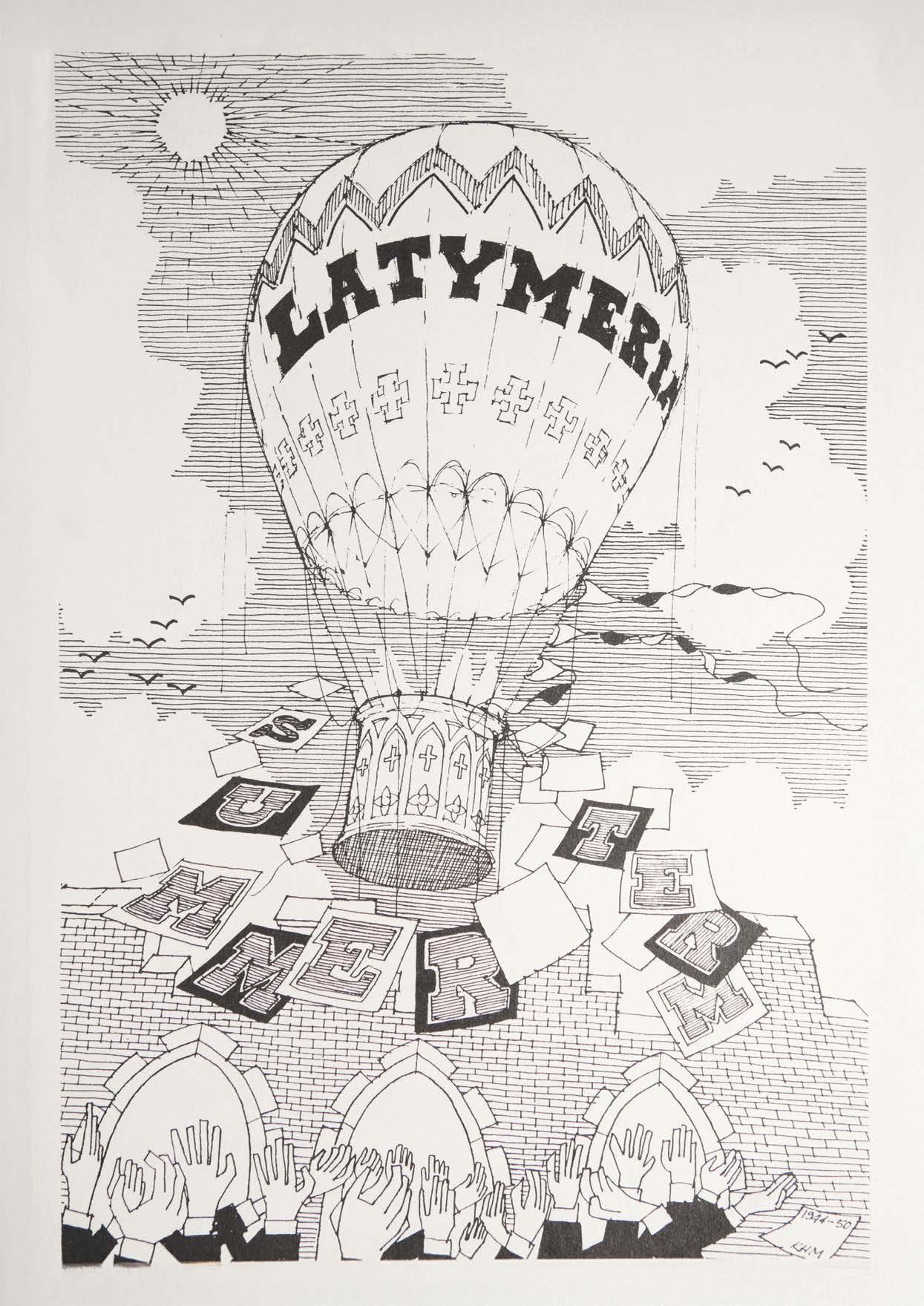

Latymerian

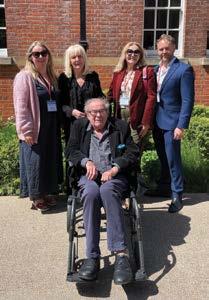
Orme - the man, the legend Remembering a beloved teacher and friend
20
What Would Gandhi Do Today? Lessons in Non-Violence
22 Meet the Makers Latymerian entrepreneurs are making their mark
39
Student Voices: Geography & Politics
Opinion pieces from talented current students



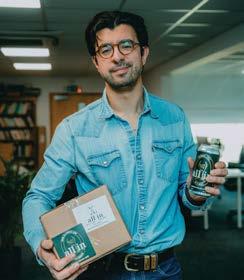
2-6 Alumni News
Staying Connected: News from near and far
7-9 Memory Lane
School day reflections 1930s-1965
10-13
School News
Hear about our latest and greatest
16-17 Latymer in the Community Our Partnerships and Outreach team make a lasting impact
18-19 Recognising Remarkable Student awards & accolades
21 Preserving the Past, Together Join the Latymer Social Archive
30-37 Events
Read our events roundup and mark your calendars for what’s next!
38 Own a Piece of History
Don’t forget to order your copy of Latymer 400
44 Your Legacy, Their Future
What makes you a proud Latymerian?
46 Celebrating a Career of Dedication
We say goodbye to three long-term staff members on their retirement
47-49 Fondly Remembered Tributes to Latymerians no longer with us
Letter from the editor





This year marks a new chapter for our beloved magazine. We’re excited to unveil a fresh style and a new annual format. By moving to one edition per year, we’re able to bring you an even richer collection of stories, updates, and insights from across the Latymerian community.
Inside this issue, you’ll find a number of special features. We pay tribute to a much-loved teacher, Robert Orme, spotlight Latymerian entrepreneurs making their mark, explore lessons in non-violence in ‘What Would Gandhi Do Today?, and our Student Voices section shares perspectives on Geography and Politics. We’ve also included our usual mix of news, announcements, and reflections, ensuring there’s something for everyone to enjoy.
And as always, please get in touch with any updates or stories you would like to share: Latymerians@ latymerfoundation.org
Happy reading!
Rhianna Williams Alumni Officer Editor, Latymerian magazine
News Alumni

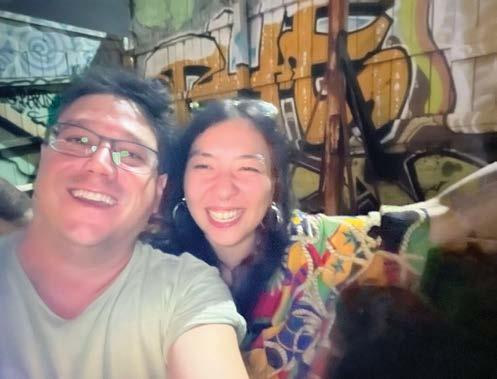
Richard HAWKINS (1957) has published an article in issue 110 (Nov. 2024) of Bristol Blenheim, the journal of the Blenheim Society. The article, titled “Just another Kriegie”: “Todd” Hawkins: 107 Sqn 1940, POW 194045’, details his father’s experiences as a prisoner of war in Germany, where he was killed by ‘friendly fire’ shortly before the end of the war.
Alan HUNT (1959) has published his fifth novel, To Die in Oslo - a sequel to his earlier books. Available from all good bookstores!
■ Marcus ATKINSON (1997) and Bea CORTI (2015) ran into one another at a pub in Auckland, New Zealand!
■ Marcus also recently married his wife, Amirah. Congratulations to the happy couple!
Matthew PRITCHARD (1999) published his first book, an academic monograph with Cambridge University Press, titled Romantic Music Aesthetics: Creating a Politics of Emotion.
Taymoor ATIGHETCHI (2007) is celebrating 10 years of his renowned stationery company, Papier
■ In July, Frankie REID (2009) celebrated her wedding with many familiar faces in attendance: Claire CURTIS-WARD, Jerome PORRITT, Alice BLACK, Ruby THOMAS, Ciara MCELLIN,


Ben STOKES, Bertie GULLIVER, Jonny TUCKER, Hannah MARKOWSKA, Indy FITZPATRICK, Harriet MORRIS, Sity SHAH, David WAKE, Jim STANNARD, Cat TROIANO and Imo PRUS (all Class of 2009).
Lucas MANSILLA (2012) has joined Carwow as Senior Strategic Partnerships Manager.
■ Chloe YATES (2017) will debut her new play The Mending Circle at the Lyric Hammersmith from 4–13 September 2025. Visit lyric.co.uk for tickets.
Sophia JAVID (2017) has been promoted to Brand and Research
Insight Anayst at Lloyds Banking Group.
Maria CHUECA (2022) has joined the Society of Study for Addiction as an Associate.
Desh SAXENA (2024) has completed a unique challenge 100 SONGS IN 100 DAYS, writing, producing, and singing a new song every day. Follow him on Insagram @ deshsax.
■ Charlotte STUBBS (2024) and Molly BARBOUR-SMITH (2025), were selected to represent England and Scotland respectively in the International Cricket Council (ICC) Women’s U19 World Cup 2025 in Malaysia.


Alan MCQUILLAN (1966) is celebrating having 11 nature pictures awarded by the International Photography Awards - a 10-picture series from the California Redwoods, and single shot in a remote part of Scotland. He’s also recently been awarded by the London International Creative Competition and the Visual Arts Association.
■ In September, Julian MAHY (1974) held his own ‘round the river’ race in honour of the Bursaries Appeal. Julian says “my pace was inspired by ‘Paulatim ergo certe’ which I took to mean small steps from a couch potato to be certain of finishing!”
■ Paul TAYLOR (1976) and Nick PETERS (1978) bumped into one another on Edgware Road and had to grab a quick selfie!
Vinai VENKATESHAM (1999) has joined Tottenham Hotspur as CEO this summer.
Sasha NATHWANI’s (2001) debut film, Last Swim, came to cinemas in April.
■ This year, Sam SKINNER (2001) was appointed as a KC. Here he is pictured receiving his letters patent from the Lord Chancellor.
Jeremy SIMMONDS (2001), cofounder of crazy golf brand Swingers has recently opened a new venue in Las Vegas!
James ESLER (2012) recently starred in a national tour of the stage adaption of Sebastian Faulks’s Birdsong.
Sophia CHETIN-LEUNER’S (2012) latest play is in the works, with a famous name taking up the lead (Ambika Mod, star of the Netflix adaptation of novel One Day).
Theo EL-KATTAN (2014) has won an award as one of The 2024 Vogue Business 100 innovators for his rare and vintage clothing business, Known Source.

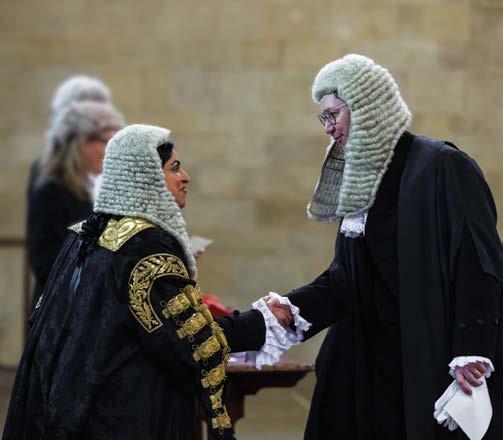


Stephen WYATT (1966) has co-edited the book Hurst on Film in collaboration with film director Brian Desmond Hurst.
Hugh BROWN (1967) now holds 13 United Kingdom International Timing Association records (UKITA) for land speed racing on his 1970 Triumph Bonneville.
■ Siddharthan CHANDRAN (1983) is leading the way in Alzheimer’s Research and was recently interviewed by The Times on a game-changing blood test.
■ Chris DORN (1984) has been elected Chairman of Hart District Council. Equivalent to Mayor, The Chairman role is largely ceremonial, but Chris will also be supporting his residents as Ward Councillor, as well as two charities close to his heart: Service Dogs UK and Mustard Seed Autism Trust.


Adam BAIRD (1994) has published a fascinating aacademic book “From South Central to Southside: Gang Transnationalism, Masculinity, and Disorganized Violence in Belize City”
After 16.5 years in civil service, Thomas BARRETT (1998) has joined Weightmans LLP as a Partner, leading their Data Protection and Privacy practice. Thomas is also honoured to be appointed a fee-paid judge in the First Tier Tribunal (General Regulatory Chamber) and a Bencher of Lincoln’s Inn.
Daniel HENDERSON (2005) read a booklet shared by the school on Remembrance Day, which details the burial sites of fallen Latymerians during WW2. In May, he visited the Kranji War Memorial in Singapore, where there are three Latymerians put to rest.
Tiago LUDOVIG (2006) has joined the International Skating Union as General Counsel.
Tim LE ROUGETEL (2006) has joined the City of London corporation as Senior Strategic Transport Planner.
Joe ARMITAGE (2007) showcased his latest lighting collection The Modernist Collection at the London Design Festival.
■ Henry FIELDMAN (2007) and Filip LJUBICIC (2007) are pictured at the 2024 Olympic Games. Henry is holding his bronze medal for coxing the women’s eights rowing team!
Calam LYNCH (2013) is starring as Bryan Guinness in new BritBox original, Outrageous.
Having completed his PhD studies, Charles SILLET (2016) has joined

Stanford University as a postdoctoral fellow.
Misia BUTLER (2017) is the break-out star playing Caeneus in Netflix production, KAOS!
■ Kaylee DEKKER (2020) celebrated graduating from her Masters of Science in Business Analytics. Kaylee was awarded with a Distinction, and has earned a Deans List recommendation for having the second highest marks in her class of 160 students. She has now joined the team at Datatonic
Julia HUNT-DAVIS (2021) became U23 World Champion in the Women’s VIII rowing!
■ Leopold HAINLEIN (2024) and his rowing crew, coached by Latymer’s Mr Barry-Parker, led the field from the 1st stroke in the VIII to become Junior World Champions.

Chat LEONARD (1979) and his son joined us all the way from California! It was Chat’s first time back since leaving school.

Anna STATCHNIAK (2022) came in to visit two of her former teachers, Mr Goldsmith and Mr Weardon to catch up and discuss her future ambitions. She was home on Spring Break from Notre Dame University in the US, where she is a Fenella Grant scholar.
John ROBERTS (1958)
Alumni Visits
David ANSELL (1956) returned for a school tour—his first visit in 60 years! He brought his family along to share the experience.
John HUDSON (1964)
John spent the day with our science department, observing a chemistry lesson and learning about the school’s exciting curriculum reform. His visit offered a wonderful opportunity to reflect on how teaching and learning have evolved over the decades.
Amile RATNASIRI (2013)
Amile gave an inspiring talk to the Sixth Form, sharing his journey into the world of engineering and encouraging students to explore the field.
Jonathan MIN (1985) made the trip to King Street all the way from New Jersey. It was his first time back since leaving school!
Joe Markowski (2006) and Leo Thompson (1998) returned to Latymer to lead a special Sixth Form assembly on careers in the sports and media industries — offering valuable insight into an exciting and everevolving field.
John came all the way from Mauritius to give the Geography Society a fascinating talk on his book ‘Shaping the Future of Small Islands’. John is pictured with our Alumni Relations Manager, Sian Davis and our Head of Geography, Alex Shackleton.

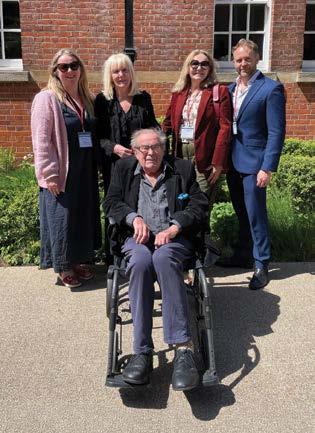
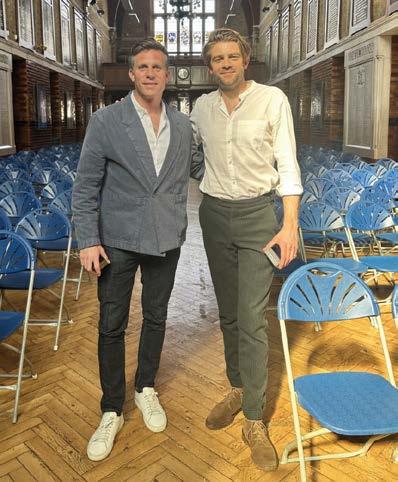

Bishi BHATTACHARYA (2001)
Bishi spoke to the Lower Sixth about her dynamic career as a music artist, blending creativity, innovation, and performance. She is pictured here with two of her former teachers, Sam Adams (Head of Sixth Form) and Tony Henwood (Director of Music)
The Louis Olympics: A Stag Do Fit for a Latymer Legend
By an Anonymous Prefect
(Class of 2007)
On Saturday 15 March, a sunny slice of Wood Lane was transported back in time to a golden era of roll calls, lunch queues, and chemistry formulas barked with militaristic precision. The occasion? None other than the Louis Olympics—a gloriously unorthodox bachelor party in honour of Louis Mole (2007), officiated with formidable flair by the one and only Mr Chris Hammond, former Head of Chemistry and Deputy Headmaster, who retired in 2007 after a magnificent 40-year tenure at Latymer.
Yes, the Mr Hammond. The one who reportedly inspired Hugh Grant’s acting career and who could silence an entire lunch queue with nothing more than a raised eyebrow and a booming “NO NO NO NO NO!”
The day began with precision timing (naturally). Unbeknownst to the stag, the party’s bus—fresh from ‘football golf’—diverted to Wood Lane. Mr Hammond was waiting in ambush, flanked by two stern-faced prefects, Khaled Koubani (2010) and Hamish Hall (2010) standing to attention with a loudspeaker and whistles in hand. In a moment that can only be described as Latymerian theatre, Mr Hammond boarded the bus and launched into a full-force disciplinary ambush, barking, “WHAT HAVE WE GOT HERE!! … I don’t know! I’d like you out of this coach now!” and thus kick-starting the Louis Olympics with all the command and chaos of a surprise lunchtime detention.
What followed was less a stag party, more a PE lesson directed by Shakespeare, if Shakespeare had also run the school detention rota.
Teams were formed—Mole Senior, Mole Junior, and Marriage Mole— and the competition began. Sack races, egg-and-spoon challenges, and a chaotic wheelbarrow race ensued. As ever, Mr Hammond was in full voice: “Football golf—pathetic!” “Tall boy! You dropped the egg!” “I’m not speaking to you as Head of Chemistry—I’m speaking to you as Deputy Headmaster!”
The prefects echoed their master’s commands with nostalgic glee, threatening imaginary detentions and enforcing impeccable Olympic discipline (sort of). Mishaps were met with “NO NO NO!”, and athletic incompetence was relished by the judges’ table.
The prize-giving ceremony was characteristically Latymerian: orange slices for the victors, and a “special prize” for the soon-to-bewed Mr Mole—whose expression suggested he hadn’t been so nervous since GCSE Chemistry.
Photos were taken in front of the Latymer pavilion, and Mr Hammond finally broke character, warmly mingling with the stag party as fizzy pop, prosecco and snacks made the rounds. The Olympic flame (or was it a picnic lantern?) flickered out at 1:45pm as the group departed for lunch and speeches.
The Louis Olympics was a day of laughter, light-hearted tyranny, and touching tribute. For a few precious hours, time rewound and Latymer’s spirit roared to life—led, of course, by its most unforgettable deputy head.
Here’s to Louis, and here’s to the inimitable Mr Hammond—proof that once a Latymerian, always a Latymerian.
The Alumni Roll Call -

■ Louis Mole (2007) – Emmy nominated Stag. Former Latymer footballer. Once starred in a Nollywood Gap Year classic. Now runs the documentary company Magna Studios.
■ Joe Armitage (2007) – Best man, creator of suspiciously expensive lamps.
■ Jamie Mathers (2007) –Perpetually mistaken for Louis Mole; bore the brunt of football-related compliments from the Head.
■ Matt Gregson (2007) –Greggy. Now a successful financier.
■ Sam Jacobs (2007) –Marathon man. Based in Portugal. Did Sixth Form at Harrodian (traitor-ish but forgiven).
TEAM MOLE JUNIOR
■ Carlo Mole (2010) – Mole Junior. Fiercely competitive football scholar and film director extraordinaire.
■ Charles Phillips (2007) –Cheese toastie mogul (Morty and Bob’s restaurants).
■ Tommy Fish (2007) – The “Tall Boy.” Successful football entrepreneur. Proud new father of Poppy.
■ Gabriel Andrews (2007) –Once a model, now a PE titan. MD of a booming Private Equity firm. Also the “Busy Earning” man from Jungle fame.
TEAM MOLE SENIOR
■ Charlie Mole – The Mole Senior. Famed film composer (Othello, The Importance of Being Earnest, St Trinian’s). Attended St Paul’s —our eternal rivals.
■ Tom McFarland (2007) – One half of Brit Award-winning band Jungle. Devoted golfer. QPR sufferer.
■ Digby Baer – NonLatymerian. Lucky to have escaped the chaos.
■ Tim Ridigilo – Another Harrodian. Sports journalist. Pen poised for post-match write-up.
JUDGES & PREFECTS
■ Mr Chris Hammond – Deputy Head, Head of Chemistry (retired 2007). Latymer legend.
■ Hamish Hall (2010) –Chemistry A**, whistle-blower (literally).
■ Khaled Koubani (2010) – Chemistry A**, logistical mastermind.
TEAM MARRIAGE MOLE
Memory Lane 400 (or 397) not out

1624-2024; 1557-1627; Saint Dunstan’s to Saint Paul’s; Fred Wilkinson to Susan Wijeratna; shorts and blazer to a suit; 1955-1964. These binaries signify notable marks of the School’s (for we Oldamerians - as one of the Jantaculums/Jantacula, riffing Tommy Steele’s “Fings ain’t what they used to be”, re-nominated Old Lats, - reach for the shift key to capitalise when we instance LUS – the School) celebrations of the life of our Pious Founder (caps again) and our shared and separate Latymerian memories.
In 1955 I joined Latymer as a shrinking little oik in the Prep –Form 1A, Mr Hursey (and I left, less shrinking, in 1964 retaining my prefect’s badge – miracle that I got one of those – which I happily sported, along with a venerable school scarf in St Paul’s this year). I remember, as one of the massed School making a pilgrimage in 1957 to Latymer’s parish church (whose impoverished parishioners were fellow beneficiaries of Latymer’s will), to join the School’s celebration, at St Dunstan’s in the West, of Latymer’s birth. But, I confess, I remember little of this event other than getting detached from the mob of fellow Latymerians somewhere in Holborn underground station and working out that they had probably shuttled to Aldwych station – as happily they had – where I rejoined my black blazered fellows

and ended up where I was supposed to be – at St Dunstan’s along with Gog, Magog and, doubtless, the shade of Edward Latymer. Thus I have been in at both the School’s formal marking of Latymer’s birth, 1557/1957, and that, I had always supposed, of his death 1624/2024.
Who now knows what form the School’s thanksgiving for Latymer’s life then took in St Dunstan’s?
Few of us who were there are now around. I can’t remember. But I can be pretty sure that, unlike in 2024, it was a male occasion: headteacher, pupils and, doubtless, celebrant were all (those eschewing binary classification – if such there were –excepted) male. Not so in St Paul’s: headteacher, bishop, many pupils happily (non-binaries still excepted of course) now female. Or was my dreamy subterranean decoupling from my fellows when I, and we, made the same journey, Ravenscourt Park to Aldwych, to appear in Fred Wilkinson’s production (music by his pal Gustav Holst) of “Old King
“My Latymer – subversive; unbiddable; iconoclastic. A School which was, as Chris Hammond, rightly characterises it in “Latymer 400” as meritocratic, tolerant and liberal”
“There
is something fitting and deeply pleasing about the circle closure which my participation in these anniversaries marks — the conjunction of birth and demise arouses both memories and reflections.”
Cole” for Associated Rediffusion’s, the new, commercial television company, children’s programme which was presented (but not recorded – this was live TV in the era before VCRs let alone YouTube and the cloud) from the corner building of Kingsway and Aldwych?
If our shared commemoration in St Paul’s of the 400th anniversary of Latymer’s will is not exactly a recurrence of the School’s celebration of the 400th anniversary of his birth there is, nonetheless, something fitting and deeply pleasing about the circle closure which my participation in these anniversaries marks and the conjunction of birth and demise arouses both memories and reflections.
Memories: first, when, in St Paul’s, we rose to sing that paean to conformity, “I vow to thee my country” I thought of one of Fred Wilkinson’s homilies from the platform in morning assembly
(delivered when I was still a shorts wearing Latymerian) when he asked (asked – not instructed) sixth formers no longer to wear coloured waistcoats to school because this made the School appear unacceptably sloppy. And then he apologised for his injunction/request saying something like “I’m sorry to have to ask you for obedience, for unquestioning adherence to authority led to much of my generation being wiped out in the First World War”. And I thought too of my contemporary, Alan Rickman’s, wonderful, biting the hand that invited you, 2007 speech at School prize giving (a sanitised extract of which is in the splendid “Latymer 400” volume). My Latymer – subversive; unbiddable; iconoclastic. A School which was, as Chris Hammond, rightly characterises it in “Latymer 400”, meritocratic, tolerant and liberal.
Richard Collins (1964)
Memory Lane
A Wartime Education and the Seeds of a Career in Chemistry
I joined Latymer while based in Slough during World War II, a time when our family adapted to the challenges of war with resilience and resourcefulness. Why Slough? My father, a researcher at Imperial College, was relocated there along with his lab when the bombing of London intensified. The lab operated out of a converted country house on the town’s outskirts. Here, he conducted pioneering work on the physiology of insects and supported the government with nutrition-related challenges, including advising on the introduction of the National Loaf, a healthier brown bread that replaced white bread. His contributions even led to my letter in The New York Times celebrating his role. Remarkably, life in Slough felt peaceful despite the global turmoil.
In the early 1930s, Slough was a modest town, not yet the industrial hub it later became. Initially, our family was split up, staying with friends connected to the lab. I lived with the Herfords, who treated me like family.
Eventually, we moved into a charming stucco house with an expansive garden and a tennis court turned lawn—a challenge to maintain with only a push mower. My school life in Slough was formative, even if I wasn’t the most diligent student. The teachers encouraged open debate, fostering my love of learning. My favorite was Graham Sutton, a former Shakespearean actor whose insights into literature and theatre left a lasting impression.
When school returned to London, I commuted daily on the Green Line bus, often completing homework en route. School in London was more rigorous than in Slough. I particularly enjoyed history and chemistry, thanks to inspiring teachers like Mr. Goddard and Mr. Wheatly. The latter, nicknamed “Dogsbody” for his leather leggings, had a theatrical teaching style that commanded respect. I vividly recall his dramatic demonstrations, like the darkened lab experiment where chlorine reacted with ammonia, producing flashes of light. Such
moments fueled my budding passion for chemistry. Inspired, my friend Cedric Lee (1950) and I conducted our own experiments at home, sometimes dangerously so. We made fireworks and chlorine gas in his coal cellar, oblivious to the risks. Safety goggles were unheard of then, yet we survived without injury. Years later, I discovered that Oliver Sacks, the famous neurologist and author, shared similar youthful exploits, sourcing chemicals from Griffin & Tatlock, as we did.
I fondly remember other teachers too, including Mr. Davies and Mr. Sharp, who taught English, and the formidable Assistant Head, Mr. Wadams. The Headmaster, Mr. Wilkinson, had an authoritative presence; even a glance from him could silence a rowdy hall. In 1948, I launched The Latymer Gazette, a student magazine that featured sections on sports, music, school news, and global events. My editorial on the escape of the Grand Mufti of Jerusalem remains a testament to my early interest in journalism.
The school operated with remarkable efficiency despite its minimal staff compared to today. With just a Head, an Assistant Head, a secretary, and about 50 teachers, we thrived academically without the bureaucracy now common in education. Visiting Latymer years later, I was struck by how much it had changed—not least in its fees, which had risen dramatically from the modest £8 per term my parents paid.
Post-war, Europe was rebuilt with the aid of the Marshall Plan, but Britain faced economic challenges, including a devalued pound. On one of my bus rides, I met Mrs. Gilbey, who lamented the impact on her family’s gin business, though history shows they endured. This conversation was a small window into the larger economic struggles of the time.
The “brain drain” that followed offered opportunities abroad for many British academics, including my father, who accepted a position


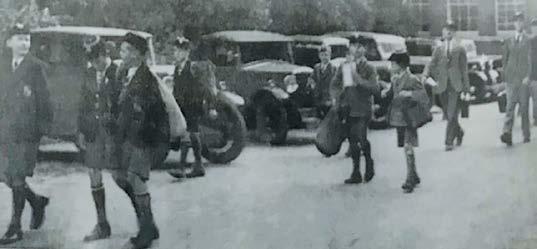
“The seeds of my scientific career were sown during those formative years, inspired by dedicated teachers.”
at the University of Illinois. This marked the start of my journey as a chemistry major, leading to a Ph.D. at Harvard, postdoctoral work at Caltech, and a fulfilling career at Ohio State University. The seeds of my scientific career were sown during those formative years, inspired by dedicated teachers and my early experiments.

Reflecting on this journey, I am grateful for the people and places that shaped my path—from Slough to Latymer, and beyond.
Gideon
Frankel (1950)
Memory Lane From Glasgow to Hammersmith
In December 1960, at the age of 13, I moved down – along with my father and elder brother - from the fine city of Glasgow to live in London. Very soon we would be starting at Latymer.
Dad, a Church of Scotland Minister, had been asked to take charge of St Columba’s Church in Pont Street. Although he was already well established as a clergyman this was very much a ‘top job’ as St Columba’s was pretty much a kind of Presbyterian ‘Cathedral’ and a home from home, socially as well as spiritually for Scots in London.
Dad had already done a ‘tour’ of a number of quite famous London schools to find the right place for Kenneth and me. After a careful survey he decided that Latymer (not perhaps at that time quite top of the tree in terms of ‘fame’) was the right place for us, and so it proved.
After the solid but pretty traditional school we had been attending in Glasgow, Latymer was like a breath of fresh air. By the standards of the day (and probably even now) it was very ‘liberal’ in all the best senses. While no-one took advantage, relationships between staff and students were very relaxed – and while academic standards were high there was a great deal of high level cultural life too. I was already a keen clarinettist and enjoyed playing in the school orchestra. The social mix (with half the boys being there on council scholarships) was also a thoroughly good feature.
In the years since (first as a teacher and then as a clergyman) it has been a great joy to keep in touch (as far as that has been possible) with old school friends.
Happy memories!
Andrew McLuskey (1965)



“Latymer was like a breath of fresh air… very ‘liberal’ in all the best senses.”
■ Exploring Art and History in Berlin
In January, Sixth Form Art and Art History students embarked on an enriching study trip to Berlin. Over three days, they explored the city’s cultural and architectural treasures, from the Alte Nationalgalerie on Museum Island to the powerful design of the Jewish Museum by Daniel Libeskind. A visit to the Reichstag offered a poignant moment of reflection on Holocaust Memorial Day, while the trip concluded with a student-led presentation at the historic AEG Turbine Factory.
■ English Department Celebrates Unprecedented Success
We are proud to share that eight Latymerians from the Class of 2024 received offers to study English at Oxford and Cambridge—a remarkable achievement. With 103 students studying English in the Sixth Form and 51 Oxbridge offers since 2013, English remains a thriving and much-loved subject at Latymer.
Cambridge Essay Prizes: National Recognition for Literary Talent
Five of our English A Level students received national accolades in the prestigious Estelle and Gould Prizes run by Cambridge colleges. Amelia won first place in the Estelle Prize for her essay on Wordsworth and was highly commended in the Gould. Orla placed second in the Gould Prize with her analysis of Irish poets. Archie and Jimena were longlisted, while Valeria earned an honourable mention.
School News
■ Language Learning Comes Alive: Spanish Debating Triumph
Two Year 13 students competed in a national Spanish debating competition, securing victories in two of three debates. The adjudicators praised their cultural fluency and linguistic precision—an impressive accomplishment.
■ Dancing for a Cause: Strictly Latymer
Our Sixth Formers lit up the stage in our very own Strictly Come Dancing, alongside spirited performances from younger students. Highlights included winning duos Charlie and Violet channeling Grease, and Paddy and Jimena dazzling to La La Land. The event raised vital funds for UNICEF and Shelter.




Exploring Art and Art History in Berlin
Language Learning Comes Alive
English Department Celebrates Unprecedented Success
Dancing for a Cause, Strictly Latymer
National Champions: Girls Hockey makes History

French Exchange Builds Bridges
■ National Champions: Girls’ Hockey Makes History
Latymer’s 1st XI Girls’ Hockey team captured the Tier 3 National Championship in Nottingham after a dramatic sudden-death shootout against Bishop’s Stortford. It’s the school’s first-ever national hockey title—a proud moment for the athletes, coaches, and entire sports department.
■ French Exchange Builds Bridges
In our first-ever exchange with École Alsacienne in Paris, students from both schools immersed themselves in language and culture. The spring leg included excursions across London and a full-day trip to Cambridge. From museum visits to stadium tours, the exchange offered a rich blend of learning and connection.
■ Strong Showing at National Fencing Championships
Thirty-six Latymer fencers took part in the Public Schools Fencing Championships, with standout performances including Julia (6th, Girls’ Senior Epee), Meyra (7th, Girls’ Junior Foil), and Alban (8th, Boys’ Senior Sabre). Several others reached the top 10 or narrowly missed quarter-final spots.


Strong Showing at National Fencing Championships

■ Skiing in Les Deux Alpes
During Easter break, students headed to Les Deux Alpes for a week of skiing in ideal conditions. With five hours of instruction daily and fun evening activities—from laser quest to a visit to a creperie—students made excellent progress and received glowing praise from their instructors.
■ Spring Concert Series: A Season of Music
March saw a spectacular trio of concerts showcasing Latymer’s musical excellence. At the Symphony Orchestra Concert, three Year 13 soloists

shone in works by Dvořák, Strauss, and Saint-Saëns. Jazz and orchestral ensembles followed with lively performances, while the Choral Concert at St John’s Smith Square delivered an unforgettable finale featuring Mendelssohn’s Hear My Prayer and Beethoven’s Choral Fantasy.
■ Success in the Coupe de la Jeunesse
Zach, Raphael and Ferdinand (all Year 13) represented Team GB in the Coupe de la Jeunesse this summer! Zach and Raphael won gold together in the Men’s pair, while Ferdinand competed in the Men’s Eight.

Success in the Coupe de la Jeunesse
Skiing in Les Deux Alpes
Spring Concert Series
■ Flying High for a Cause: Student Skydive
In May, 14 brave Year 12 students took part in a charity skydive! After a 20-minute climb, the plane door opened. One by one they fell a mile in 30 seconds (at 125mph no less!), their parachutes then slowed for final descent at 30mph. Together, our students have raised over £5,750 for M-LISADA, an educational charity we work closely with in Kampala, Uganda.
This October, another group of Latymer students will travel to Uganda to witness firsthand the transformative work of M-LISADA.
■ Hamburg Exchange 2025
During the Easter holidays, a group of Year 10 Latymerians and students from Godolphin and Latymer travelled to Hamburg for the return leg of our Hamburg Exchange.
As ever, the teachers at the Johanneum school had put together a varied and exciting programme of activities and trips. Most were based in and around Hamburg itself, visiting different parts of this beautiful and vibrant city, but we also visited the pretty Hanseatic city of Lübeck. Highlights included visiting the Green Bunker, going on a street art tour, and visiting the court. Students also spent time with their partners in school, taking part in lessons and gaining an insight into the German school system.
■ Latymer Crowned Philosothon National Champions
A team of 10 Latymerians travelled to Eton College to compete in the national final of the Philosothon, an international philosophy competition.
Latymer qualified by winning the London Philosothon in February, and faced off against other regional winners including Eton, St Mary’s Ascot, Cheney School, King Edward VI Camp Hill, Kingswood, and Taunton. Across four rounds, students explored themes such as personal identity, free will, ethics, and patriotism, guided by academic judges.
After the highest-scoring student from each school was announced, a double win for Latymer was revealed: Bertie in Year 11 was the top-scoring student in the whole competition, and Latymer were the overall winners, closely followed by Kingswood and Cheney.
This marks Latymer’s first national Philosothon title—an impressive achievement for the team, supported by Mrs Dunleay, Mr Qasim, and coach Mr Galazoulas.



Latymer Crowned Philosothon National Champions
Hamburg Exchange 2025
Flying High for a Cause: Student Skydive
Memories of Robert Orme
Robert Orme was one of our school community’s most cherished teachers. He taught at Latymer from 1967 – 2014 and, more recently, remained an active part of the Latymer community with his renowned online lectures.
Hey Bob Orme (as you go out that door, term ending, atheistic holy day beginning) in wherever you go next . .
Don’t cut your beating heart on that sharp mind compassion & curiosity combine a heart reaching out questioning, and a generosity of spirit that has room for everyone
We are the thousands you have helped to be our full selves in the world, each of whom have doubtless helped hundreds more.
That makes you one in a million, and these words just one tiny fragment of the tapestry of appreciation we would weave for you from Grosmont to the Tudors and Stuarts, from art to humanity, from just about managing the pre-teen and the teen years to parenting, grandparenting and then the big beyond, the punchline that makes this nonsensical tale make sense at last.
Justin Kenrick (1977)

Robert Orme was my first ever history teacher. Like most children of my period I had essentially learnt Ladybird history up to that point. Names of Kings and Queens, dates of battles, etc. In fact I had always very much enjoyed this but Robert’s approach to teaching medieval history was totally transformative. All of a sudden I was learning to understand what life was actually like in the middle ages, how people thought, what they believed and why. It was all amazing and astonishing. Robert taught me to be interested in things I never would have expected to find interesting.
Evan Artro-Morris (1980)
If one teacher was to remain in my mind more than any other when I was at school, it would be Robert Orme. My world is a better place as a result of his teaching.
Lane Bednash (1981)
There were several things that could be considered as remarkable about Robert Orme, or Bob as he was respectfully referred to by some of us as his students. His teaching methods, his enthusiasm, the way he could engage you in conversation about ideas, Grosmont history trips and more made him exceptional.
Roger Smith (1982)
When asked what led me to working in an art gallery, I tell people about Robert Orme. His History of Art classes were an oasis of calm, students captivated by his storytelling beside a slide projector slowly ticking in a dark classroom. Some lessons would be spent analysing just one image, unpacking Renaissance symbolism which led to discussions beyond the painting – on Humanism, Sociology, Philosophy and Botany. These were masterclasses in ways of seeing, in which Robert was genuinely curious in our interpretations. His lunchtime clubs were rigorous, quizzing us on our favourite critics, our opinions on current exhibitions and tasking us in writing reviews. His insistence for analogue methods (all essays had to be handwritten) commanded our respect and patience. Beyond instilling us with an encyclopaedic art

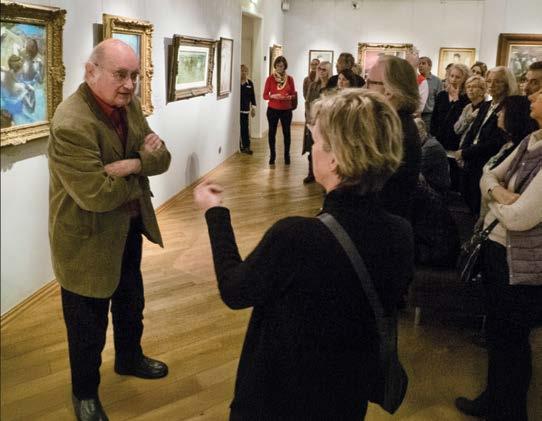
foundation, Robert gave us openness when confronted with new material, and a confidence to develop an opinion. I will always remember his warm character and beaming smile.
Pascale de Graaf (2014)
As a form teacher, history teacher and as his captain of cricket aged 12 – he just had an enormous effect on me as at such a delicate age, be it on the dilemmas of life as much as the intricacies of cricket. And God did we have fun with him: from allowing us to do pranks on strangers as we stopped at lights on our way to sports games, to giving us the licence to buy our own dinners on a modest stipend in supermarkets when on tour. Or from an academic side of things, his encouragement to push the boundaries of creative interpretation when dissecting Hieronymus Bosch – his approach was just exhilarating. Mr. Orme just knew how to teach, how to inspire.
Chris Carroll (2001)
He was quite simply the most captivating, inventive and charismatic
teacher any of us ever had the incredible fortune to meet. I still remember the excitement in Second Form when you’d look down your timetable and realise you had history with Mr Orme that day. It was like theatre. He was the teacher you’d tell your parents about.
Most genius of all was the famous Indulgences lesson, where we sat down and Mr Orme immediately hit us with a tongue lashing for trivial infractions. “You, Jack, you didn’t close the door when you came in. And you, why is there ink on your pencil case?” It was frightening. The room fell into horrified silence. It was the most dramatic tension we’d ever experienced in our short lives. Where had the friendly Mr Orme gone?
And then, he gave us a way out. “With this piece of paper, you can be forgiven”. Aha, It was an act! A novel way of introducing the corrupt medieval church practice of selling indulgences. We were talking about that for weeks after. I still talk to old school friends about it.
That was a true highlight, but any exchange with Orme was always delightfully engaging and original. Even D-team rugby practice in the Furnival Gardens drizzle would be peppered with enjoyable remarks and eccentricities.
His image-led style of teaching was original and brilliant - you never knew what he was going to put up there next. But most of all what everyone loved about Robert Orme was that he spoke to us as equals. Never patronising, never bored by us. When he was talking to you, all he cared about was making sure you were totally enraptured.
Jack Rivlin (2007)
To this day the only teacher I have had at any stage where “grown” people would race to be at the front of the class.
Dark room, old slide projector and one hell of a story teller. He lived a life he loved and was a seriously gifted teacher.
Charlie Regis (2011)
Robert was just a joy to work with. As Director of Admissions at Latymer for 14 years, he was a trusted and supportive colleague. A fantastic and inspiring teacher, erudite, learned, never boastful, humble, but always happy to share his knowledge and love of his subject. And what fun. I well remember the stores of – very unhealthy – food for the Grosmont trip, the tales of the minibus door not shutting and a boy being told to hold it shut all the way down the M4. When in charge of school comms I received a call from a petrol station to say a Latymer minibus had filled up with petrol and then driven off – Robert just had his mind on the trip and nothing so mundane as paying. Hilarious. You always wanted to sit with him at lunch and have an interesting, challenging and fun discussion. A great man and it was never the same there without him.
Cat Sutherland-Hawes (Former Staff)
I was lucky to have been part of Robert’s 1968 Form 2O. In retrospect, Robert was revolutionary from day one. Latymer was a school that still used the cane. Robert broke the mould. He harnessed the power of encouragement, where others feared to tread.
For a 1968 project he wrote me two jam-packed pages of comments: “excellent”, “hilarious”, “delightful” and “marvelous”; “you use photos throughout better than I have ever seen elsewhere”; “what I find fascinating about your mind is the way you move between ideas and visual images of things”; “with you, you don’t just get the facts, you get a package Mustacchi deal”; and, “thanks for doing so much”.
Thanks for doing so much.
Encouragement as a teaching tool; a lesson I learned and applied in later teaching and management roles. Encouragement released other delights: inspiration, stimulation, cheer, humour and horseplay—and a hop, skip and a jump to our first field trip to Bodium Castle and a reenactment of Agincourt.
Robert graded my jam-packed project 60/50. He commonly graded 120/100, and variations thereof. He confronted convention and swept away the bricks in the wall. It boggled my mind and lifted me beyond the horizon—he could see for miles and miles and miles.
One sunny morning in 1968, we stumbled upon ‘Whistling Bob Orme’ parked just inside the school gates. He was grinning beside his definitelyseen-better-days yellow-ishy car, hands slick with mud.
“What’cha doing, Sir?”
His car was due for its MOT test— he’d plugged a hole in the floorboard beneath the pedals with mud. Improv, optimism and mud, all in one lifelesson.
Danny Mustacchi (1975)
It’s no exaggeration to say that being taught by the inimitable Robert Orme changed the course of my life.
I once told him that he had made such a deep impression on me that I could still recall his very first lesson.
Robert smiled. “Go on then — what did I say?” he asked with a grin, calling my bluff.
I replied that the key phrase I remembered from that lesson was, “standing on the shoulders of giants” — the idea that the men of the Renaissance were building on what had been achieved by the Romans and Ancient Greeks before them.
Robert’s huge grin said more than words ever could.
He was a true giant of the teaching profession.
Nicholas Bugden (1974)
Robert was a brilliant and inspiring teacher and the best I ever had by some distance!
Andrew Macmillan (1988)
I arrived at Latymer in 1979, with just two years of teaching experience and an awful lot to learn. Robert helped me see that taking children and their ideas seriously did not make one a soft touch, but actually the reverse.
Stephen Parry-Jones (Former Staff)
Robert once said that a fellow student at Cambridge predicted with his lifestyle, Robert would be lucky to make 30. This chap qualified as a doctor! His wisdom extended to cooking, insisting only good wine should be used to make a stew. But my main memory was he made learning fun, he was part of the transition from the old-fashioned “schoolmaster” to teacher, whose didactic approach was invigorating and thought-provoking.
David Millward (1972)
Join us on Saturday 27 September for A Celebration of Robert Orme’s Life and Work. Full details can be found under events in this edition of Latymerian.
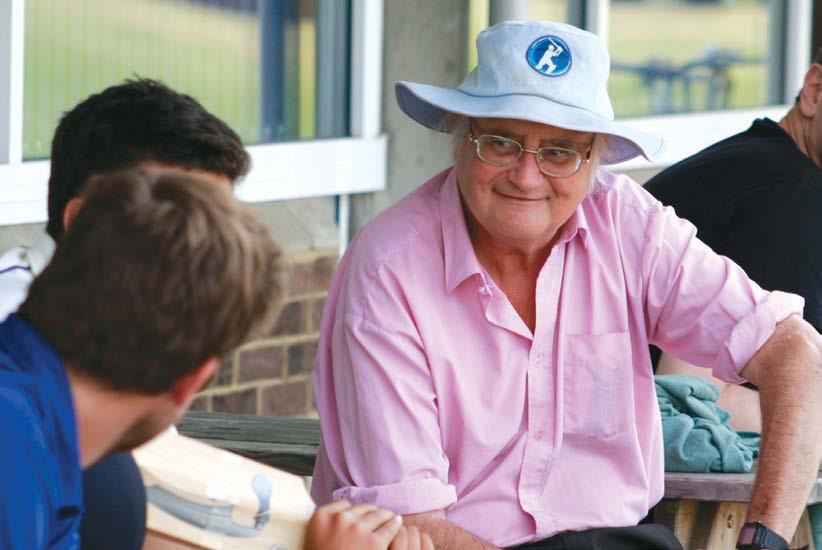
Making a Lasting Impact: Latymer in the Community 2024–25
Community Partnerships in Action
Beyond our own programmes, Latymer continues to serve as a hub for longstanding partners including Tri-Borough Music Hub, Let Me Play, the Metropolitan Volunteer Police Cadets, and the Polish Saturday School. This year, we also welcomed new partners, London Borough of Hammersmith and Fulham Young Carers. Together, their weekly programmes and holiday camps benefit more than 350 local children
During the Easter and May half-term holidays, Let Me Play’s HAF (Holiday Activities and Food) camps supported over 100 children—65% of whom receive free school meals—while Fulham Young Carers hosted 15 children on-site. These camps have returned for the summer, with children enjoying activities ranging from cooking and crafts to performances and swimming.
Sharing Knowledge and Opportunity
Latymer staff and students have also given generously of their time and expertise:
■ GCSE Revision Camps: Two of our Science teachers partnered with the West London Partnership to run Biology and Physics revision sessions at St Paul’s Girls’ School for state school pupils.
■ STEM Academy: 23 Year 7 and 8 students from local schools spent five Saturday mornings exploring coding and robotics— culminating in take-home Micro:Bits, their own robots, and a fascinating talk on AI by guest speaker Yao Li. Our thanks go to the Computing and Science teams and our brilliant Year 12 volunteers.
■ Medical Applications Webinar: Two enterprising Year 13 students hosted a virtual session to demystify medical school applications, joined by over 25 pupils from local schools.

The Power of the Arts
■ Play in a Day: In May, 42 pupils from nine local primary schools took part in a lively day of drama, movement, and performance in the Edward Latymer Theatre supported by our Drama team and A-Level students.
■ Bugsy Malone Preview: We welcomed 112 Year 6 children from four local schools to our Lower School production dress rehearsal.
■ Music Recitals: Over 300 children from Brackenbury and Queen’s Manor Primary Schools were treated to engaging performances by Latymer musicians, offering many their first experience of live classical and contemporary music.
■ Classics Workshop: Students from four local secondaries joined us for our second annual workshop exploring the Classical World, organised by our Classics department.
Academic Outreach
■ Bright Sparks: Nearly 50 Year 5 children joined this year’s programme to prepare for 11+ assessments and gain confidence across core subjects. We look forward to welcoming five Bright Sparks participants as Year 7 students in September!
■ Maths Challenge: Over five weeks in April and May, 48 pupils from 15 primary schools engaged in creative Maths sessions, with the programme culminating in a lively final.
Over the past academic year, we’ve been proud to engage more than 4,000 local children and young people through an exciting range of free programmes, including holiday camps, sports sessions, and activities in the creative arts.


Sport and Wellbeing
■ Hockey and Cricket Coaching: Our sports coaches have continued to provide top-tier coaching to students from Chiswick School, free of charge, thanks to the generosity of School Kitchen at our new Chiswick Sports Ground.
■ Staff Wellbeing: We’ve been proud to host Imperial NHS Trust and Chelsea FC Foundation’s wellbeing sessions at Wood Lane, supporting up to 100 NHS and Foundation staff.
Service and Volunteering
This summer, over 200 Year 12 students completed placements as part of our Service in the Community programme—contributing to schools, charities, shelters, libraries, sports clubs, and more. We’re so grateful to the many alumni and community partners who support these meaningful experiences.
A New Initiative: Teachers in the Community
During this year’s Activities Week, more than 20 Latymer teachers swapped their usual classrooms for local schools, delivering lessons in Science, English, Art, Classics, and Music. One teacher from Hurlingham Academy wrote:
“Thank you for visiting and delivering such an engaging session. It sparked real interest and made a lasting impact.”
This new outreach initiative is one we hope to grow in the coming years— nurturing professional collaboration and community connection. We thank all our colleagues, student volunteers, partner organisations, and alumni who make these wide-ranging projects possible.
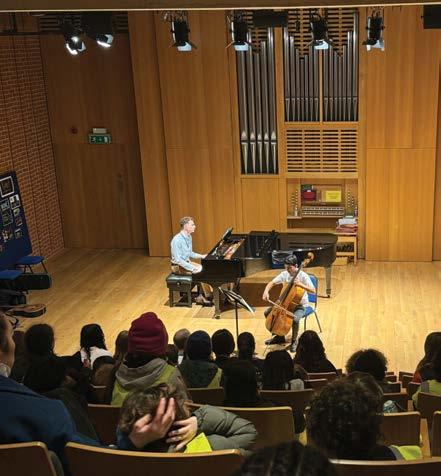

Recognising Remarkable
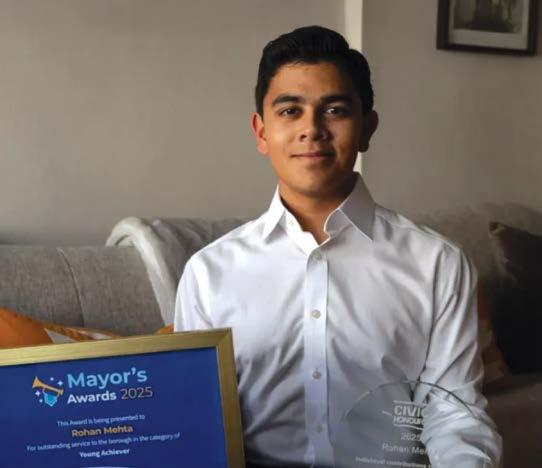
Rohan (Year 13) isn’t just hitting the books; he’s rewriting the narrative for London’s homeless community with a powerful project.
While juggling the demands of A-levels, Rohan launched In The Bag, a project that delivers essential hygiene kits to those who need them most. The kits include toothbrushes, shampoo, eye masks—the everyday items that make a world of difference.
It all started with repurposed airline amenity kits collected by Rohan’s father. Before they knew it, their living room had transformed into a bustling hub of hope. Rohan, along with his family, have poured countless hours into meticulously packing each bag, adding a personal touch with handwritten messages of encouragement.
Rohan’s incredible initiative has turned heads across London. In
March he received the prestigious Young Achiever Award from Kensington and Chelsea Council. Not stopping there, Hammersmith and Fulham Council followed suit, bestowing a civic honour for his contribution to creating a kinder and more inclusive society.
“Homelessness has always resonated deeply with me,” Rohan shares. “I didn’t want to just talk about it; I wanted to take action and restore dignity.”
This drive comes through in everything he does. Drawing from his economics studies at Latymer, Rohan understood the systemic barriers faced by those in poverty.
“Without basic hygiene, something as crucial as a job interview becomes nearly impossible,” he explains. His goal? To tear down those barriers and help people move forward with confidence.

Aara (Year 9) has been awarded a Mayor’s Award from the Royal Borough of Kensington and Chelsea in the category of Young Achiever.
This award is in recognition of her fundraising for the charity West London Action for Children.
Since the age of seven, she has been selling her handmade crafts and jewellery as well as sourcing items to sell, donating 100% of the proceeds to the charity.
She has participated in various events where she manages her stall independently and engages confidently with customers, raising awareness about the charity’s work.
Over time, Aara has inspired other young people in the community to get involved in fundraising, many of whom hadn’t realised that young people could contribute until they saw Aara running her own stall.
The Mayor’s Awards scheme recognises the people and organisations who have gone above and beyond to make an outstanding contribution to the local community.
Teri (Year 11) has been selected to represent the United Kingdom at the International Mathematical Olympiad (IMO) – the most prestigious mathematics competition in the world.
The IMO is not only the oldest of the international science Olympiads but also widely regarded as the most challenging. Earning a place on the six-person UK team is an extraordinary achievement for any young mathematician, and for Teri to do so while still in Year 11 is truly exceptional.



Claudia (Year 13), has been awarded the Ron Cooke Award from the Royal Geographical Society for her Geography NonExamination Assessment (NEA). This highlights her outstanding independent investigation; ‘To what extent does the carbon content of trees differ between urban woodlands in Highgate Wood, London, and rural woodlands in Parnholt Wood, Hampshire?’. Out of 35,000 students completing the NEA, Claudia’s project was selected as the best in the entire cohort, an extraordinary achievement.
The judges were particularly impressed by Claudia’s meticulous and detailed approach to her research. Her statistical analysis demonstrated exceptional precision and a deep understanding of the subject, which set her work apart from other submissions.


This September, we will proudly host the Hannah Lynch Awards: A Celebration of English at Latymer.
This special event recognises the creative achievements of our students while honouring the memory of Hannah Lynch (2024), whose passion for English continues to inspire us.
We’re delighted to welcome back a number of former students –accomplished writers in their own right—who will present the awards and share in this celebration of literary talent.
Our keynote speaker will be Booker Prize nominated author, Maddie Mortimer (2014).
Whether you’re seeking networking opportunities, careers advice and mentorship, reconnecting with old friends or simply staying updated on school news, Latymer Connects is your gateway.
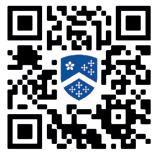
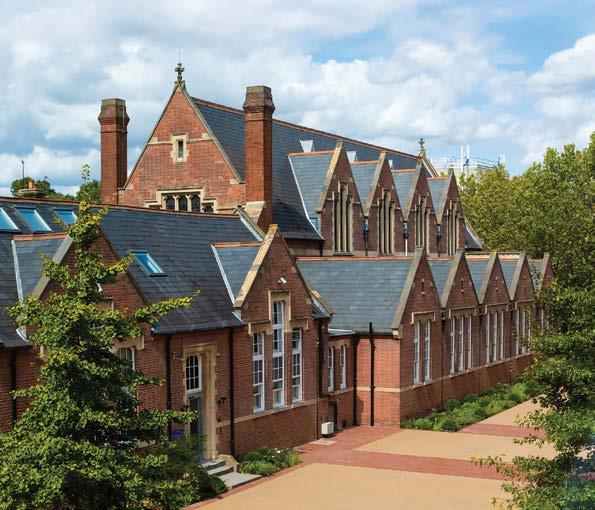
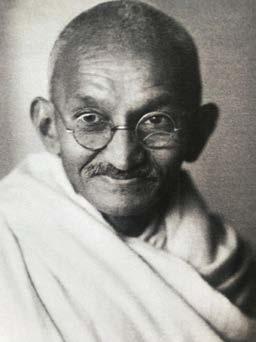
Mahatma Gandhi And Me
Peter Popham (1970)
For the past couple of years I have been talking to various groups around London about Mahatma Gandhi and his amazing career of non-violence. At a recent event, one audience member asked me, ‘How would Gandhi have managed in Gaza or Ukraine? Surely his methods would not have worked in either of those terrible war zones.’
But that’s the extraordinary thing about Gandhi. His success in bringing about great social and political change without the use of violence, through what he called satyagraha or ‘truth force’ – was equally unthinkable in racist South Africa, where he lived for 20 years as a young man and developed his ideas and methods, and in
British India. The most saint-like political figure of the past 200 years, he is equally remarkable for his creativity, his eccentricity, his sense of humour, his absence of ego, his crazy faddishness…
In other words there has never been anyone like him before or since, so it’s impossible to imagine what he could have achieved if he was alive today. Even the way he reinvented his appearance, from London dandy to ‘half-naked fakir’ (in Churchill’s rude description) was unlike anyone before or since. Try and imagine Keir Starmer or Nigel Farage swapping their business suits for a peasant loin cloth, then never wearing anything else ever again, even to meet the King in
Buckingham Palace, as Gandhi did in 1930, and you get the picture.
I started learning about Gandhi when The Independent sent me to India to cover the 50th anniversary of Indian independence in 1997. I quickly learned that Indians weren’t in the mood to cheer about securing independence from Britain. Weighing far more heavily on their minds was the disaster of Partition, the division of the subcontinent into India and Pakistan, which enabled Britain to leave the scene.
Unlike some people these days, I don’t hold Britain uniquely to blame for this disaster, in which up to a million people died. The leaders of the Hindus and Muslims
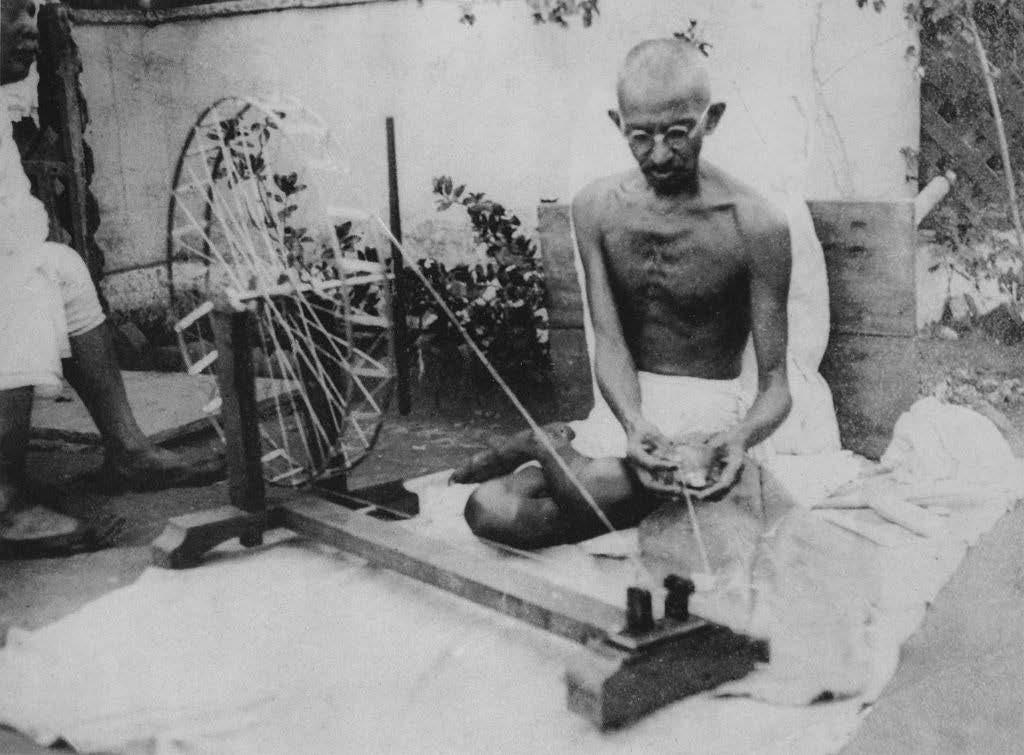
were equally at fault for failing to see what a bloodbath would result – though the decision of Lord Mountbatten, the last Viceroy, to accelerate the process was certainly a grave error.
For Gandhi personally, Partition was a terrible tragedy. For all his adult life he had devoted himself to the dignity and unity of the Indian nation. Now here it was, freed from imperial rule – but cruelly and permanently sliced in half.
Gandhi’s life and work, the fiasco of Partition, the unending enmity between India and Pakistan (in the headlines again only a few weeks ago) – these seized hold of my imagination during the five years I lived with my family in New Delhi. The result was my novel India Be Damned: the story of those years fictionalised and told through the lives of a group of imaginary foreign journalists posted, like me many years later, to the Indian capital. It was published in 2022. Lots of people have told me they love it, and it has been described as ‘a must read’, ‘powerfully evocative’ and ‘a masterpiece.’
In talking to groups about Gandhi, I have found it useful to contrast him with Churchill. They were near contemporaries, but it’s hard to imagine two characters more different, or two minds more opposed. What I found fascinating was that in both cases their characters were formed by their early experiences abroad – Churchill in India and Gandhi in London, perhaps a good advertisement for gap years?

The Latymer SOCIAL ARCHIVE
One of the most exciting legacies of Latymer’s 400th anniversary year has been the digitisation of our fascinating school archive! What better way to remember our origins than by making the historic documents, some of which date back to the 1620s, accessible to our alumni community. But this online archive is home to so much more than our remarkable collection of 17th, 18th, and 19th-century ledgers and Minute books - extraordinary though they are.
Latymer’s Social Archive brings our history right up to date, drawing on photos, school magazines, and recollections from Latymerians around the globe. The wry humour of students from across the decades can be appreciated whilst reading the full online collection of the Latymerian magazine - whether the articles were written in the 1890s or 1990s. This dynamic social space is curated by you, our alumni. Latymerians can upload and share their collection of photos and memorabilia, where classmates can re-connect and recall memories of their time at the School.
You can help fellow alumni put names to faces, strike up conversations on the platform, and comment on posts and articles or photos. Of course, if you prefer not to interact then just browsing is fine.
We want this to be a space for you to use in a way in which you feel most comfortable. It’s really easy to join the Latymer Social Archive and to upload your own collections of photos, production programmes – anything Latymer-related. Every Gild ticket tells a story!
Admittance is password-protected and is currently open only to our alumni community.
Simply visit bit.ly/Latymer-Social-Archive
After registering, click on the ‘Start Here’ button on the left-hand side panel and follow instructions to get started. You can register on your mobile phone or any other device, but to get the most out of browsing the site we do recommend a tablet, desktop or laptop as the Social Archive is not mobile optimised.
This is an organic and evolving project and we will regularly be adding archival documents from our existing archive, along with new additions from alumni uploads.
We look forward to welcoming you to this exciting new space for all Latymerians!

Resilience by the Slice –The Story of Base Face Pizza (so far!)
Tim
Thornton (2007)
In 2020 I was touring the world as a jazz double bassist, when COVID hit and sent the music industry into a spiral that it’s still struggling to recover from. At the time, I had a little Ooni pizza oven in my garden, and decided to pass the time in lockdown trying to make the perfect pizza. I soon realised, to do this, I was going to have to make a lot more pizzas than my family could possibly eat, so I decided to start a weekly pick up pizza night from my house in aid of the NHS charities, supplying friends and neighbours with pizza, in return for a small donation to the charity.
Through this, I ended up meeting a lot of people in the network of small businesses around West London, starting with the owners of a small wine bar called Vindinista in Acton, who offered me the use of their kitchen to supply pizzas to their customers. Soon I was doing five nights a week at the wine bar, a night at the Hogarth Health Club in Chiswick, and two farmers markets on Saturday and Sunday mornings. It had very quickly turned into a fulltime job, with a giant dough mixer under the stairs in my house and a whole fridge dedicated to dough and mozzarella in the corner of my kitchen.
After a year of carrying my portable ovens around, I knew this is what I wanted to do, and I wanted a permanent home. I came across a little Greek Cypriot restaurant for sale at 300 King Street, which was perfect for me to start up my little operation. I had a plan to open a pizzeria targeted at the people who live in my local area, utilising the network of local producers and suppliers that I had met on my travels around the markets, and
highlighting my slow fermented, digestible dough, spawning the motto on the window of all my pizzerias “neighbourhood pizzeria, local ingredients, slow dough”. On 9 June 2021, I opened the doors there. I was the only chef working five days a week and figuring out how to run a restaurant, with no experience working in hospitality before. I had a great manager who made the front of house team run smoothly, and a few friends who came in to help me at the busy times on the weekends. When we first opened, we had a little bell in the kitchen that we rang in celebration if we managed to sell 100 pizzas in a night. Cut to four years later and we’re consistently doing 300+ pizzas a day.
I have been very lucky to have the experience of the chefs who have joined me on the journey to bring all their hints, tips and methods as to how to run an efficient and effective pizza business. At the beginning, I think I tried to do too much myself without asking for help, for fear of being caught out as a fraud in the hospitality world, having no experience. In hindsight, if your message and ethos are good, people want to join you, to be a part of the journey and to help improve the business in any way they can. I have built a network of people who I can trust now, who are invaluable to the business in every decision I make.
After a year and a half there, I saw a site on the riverfront in Barnes, which I immediately knew was going to be my second pizzeria. I called the estate agents and had an offer on the place by that evening, and opened there in January 2023. That site, due to the great location, has been full since the day we opened. Buoyed by the success of the first two, when a
chef of mine sent me the details of a pizza place that was on the market in Putney, I decided to take a third site. This one was not the same as the others, twice the size and a different area, and from day one I realised it was more difficult to get customers through the door. It took a year or so for me to find my feet with that one, but finally when I got to the heart of what the people in Putney wanted, I got the site into a consistently successful place. This was a hard lesson to learn, but a very good one, it’s made me be more cautious, and really study the fine details of how I run the business, which has ultimately made the other two sites run in a more efficient way.
Through the past five years of running Base Face Pizza, I’ve learned that for me the key to running a hospitality business is to have a plan, and adapt it in the moment. Not everything you try will be successful, and that’s OK. If it doesn’t work, think why, and is there a way I can adapt it to work? If not, chalk it up to a lesson learned and move on. I’m still pretty new to the business, and well aware that there are lots more lessons, both tough and useful, to be learnt in my future, but as long as I follow my gut and try to do the best thing for the business and my employees, I can at least say I did my best, and that’s all I ask of myself.
I think I tried to do too much myself without asking for help, for fear of being caught out as a fraud Tim Thornton


George Cathcart (2013)
From Handcrafted Clothing to Craft Beer
What have been some of the biggest challenges (and surprises!) in getting the venture off the ground?
Can you tell us the story behind All in Beer — where did the idea come from, and what inspired you to launch it?
I stopped drinking two years ago, but I still wanted to go to the pub with my friends and enjoy the same social experiences. While they ordered their regular pints, I was left with either a 0% version of their drink — which often felt like an afterthought — or one alcohol-free beer option that, quite frankly, didn’t taste great. I thought, There must be others like me — people who want to enjoy a proper pint without alcohol, without feeling like they’re compromising. Out of that frustration came a question: What if I could do better?
How would you describe the brand and what sets it apart in the craft beer space?
All In Beer isn’t just a product — it’s a mindset. We’re the only alcohol-free beer brand that stands for something beyond the liquid in the can. Our brand is built around living with intention, embracing challenges, and giving your all — whether that’s in your career, personal growth, or everyday choices. We’re here for high achievers who demand more from themselves and from the brands they support. It’s not about what you’re avoiding — it’s about what you’re going all in on.
The biggest challenge was getting the beer itself right. It had to taste amazing — something people would actually choose to drink, not settle for. I spent months traveling across the UK to find the right brewer who understood my vision. I knew exactly what I liked in beer, and more importantly, what I didn’t like about the current alcohol-free options.
Another challenge was the logistics. When my first batch — around 8,000 cans — arrived, I had to carry them up three flights of stairs myself. Not fun. Lesson learnt.
The biggest surprise? How positively people responded to the brand from the start. Launching a business means putting your creativity and values out into the world, which is scary — you’re opening yourself up to criticism. But I’ve learnt if you risk nothing, you gain nothing.
You need to be willing to roll up your sleeves and do everything
George Cathcart

How did your experience with Cathcart London shape the way you approached All in Beer?
I wouldn’t be where I am today without the eight years I spent building Cathcart London (a heritage menswear company co-founded by George). As cofounder, I had to get hands-on with every aspect of the business: building an online store, managing suppliers, customer service, logistics, marketing, hiring — you name it. That experience taught me resilience. In business, there will be hard times and good times. You’ve got to stay steady through both and keep moving forward.
What lessons from your first entrepreneurial venture have stayed with you?
The biggest one: nothing can be beneath you. If you’re not willing to roll up your sleeves and do everything — from admin to deliveries — you’re probably not ready to run a business.
I also discovered that creativity doesn’t just mean being artistic. It’s about how you solve problems and think differently. I always knew I was wired a bit differently, but entrepreneurship gave me the medium to express that creativity.
Have your motivations or approach as an entrepreneur changed over the years?
Definitely. In the early days, I think I was more focused on what I wanted to create — what excited me. But over time, I’ve realised that the real key to building a sustainable business is putting the customer at the heart of everything. Now, I spend far more time thinking about the customer’s journey: What do they want? What do they value? How can we improve their experience at every touchpoint?
It’s not about ego or chasing ideas just because they seem cool — it’s about creating something that truly serves people. Sometimes, that means letting go of personal preferences if they don’t align with what’s best for the brand or the customer. That shift in mindset — moving from “what do I want to build?” to “how can I create real value?” — has made me a better entrepreneur.
How have you found navigating entrepreneurship in today’s climate — both the opportunities and the pressures?
We’ve never had more tools at our fingertips — between the internet, AI, and social media, the barrier to entry has never been lower. You can find suppliers, test your ideas, and build a business with just a laptop and a bit of grit.
As for pressures, I try not to dwell on them too much. There will always be reasons not to start something. But if you’re waiting for the perfect time, you’ll be waiting forever. Sometimes you’ve just got to go for it.
What’s been the most rewarding part of the journey so far?
Honestly, how much I’ve learnt about myself. Every day is a new challenge, and every challenge teaches you something.
Are there any standout moments where you thought, “Okay, this is really working”?
Yes — my first major order came from a renowned institution in Mayfair. That was a turning point. It validated that this wasn’t just a passion project; it was something with real commercial potential. That’s when I thought, Okay, we’ve got something here — let’s see how far we can take it.
What’s next for All in Beer?
In the short term, I’m looking to expand the range to include bottled beer, stouts, and ales. But longterm, I see All In evolving into a full lifestyle brand. Beer is just the beginning.
Do you see yourself building more businesses in the future?
Absolutely. I don’t think I can help it — I genuinely love every part of building something from the ground up.

Any advice you’d offer fellow alumni thinking of starting their own venture?
Everyone has a good idea — it’s the execution that makes the difference. Be prepared for things to go sideways, especially in the short term. But if you keep going, stay adaptable, and keep learning, success will come.
UNIT

Let’s start at the beginning— how did UNIT Gallery come to life? What was the moment that sparked the venture?
UNIT was born in a small shopfront in Chiswick in 2013. The space was unassuming - an old charity shop that had been sitting empty for several months. But we weren’t waiting for permission or perfection. We were both in our early twenties, disillusioned with the exclusivity of the art world and fueled by a belief that contemporary art should be accessible, engaging, and relevant. We didn’t have any experience running a gallery - nor any connections in art - what we had was intuition, creative conviction, and a sense that we could do things differently. That raw, idealistic energy was the spark. In those early days, we were doing everything: painting the walls, cleaning the windows, curating the shows, designing the website, sales materials, etc etc. That DIY spirit was the perfect foundation for us to become compassionate leaders as the business grew.
When you were first setting up the gallery, what were your ambitions? Did you imagine it becoming what it is today?
To be fair, our ambitions were huge from the outset, but they weren’t necessarily defined by traditional art world markers of success. We weren’t setting out to create just another gallery. We wanted to create a movement - a new kind of cultural platform built for our time. That said, we could
never have imagined exactly where UNIT would go: international art fairs, museum collaborations, a global collector base, representing artists who now feature in major institutional collections. We have the rebellious chromosome and as the gallery has grown, we’re more mindful than ever of being careful not to conform. It’s easy to assimilate and slip into habits that homogenise the art business. So above all, what we’re proud of is the community we’ve built around UNIT and its values. It’s that human connection to culturally curious audiences, artists, collectors - that keeps us grounded and ambitious.
Did your schooldays shape or influence your path into the art world?
Absolutely. We met at Latymer in Year 7 and became best friends. Latymer taught us to think independently. It gave us a platform to question norms, explore ideas, and develop conviction in our own voice. Art wasn’t always the obvious path - we didn’t come from traditional art world backgrounds. But Latymer gave us the curiosity and confidence to forge our own route, and when we weren’t playing sports, the art studio was always a happy, creative place of excitement and experimentation. It also taught us the value of collaboration: we were friends long before we were business partners, and that shared foundation of trust, humour, and creative ambition has shaped UNIT at every stage - and continues to do so today.
Gallery
Joe Kennedy and Jonny Burt (2008)
Believe in your uniqueness. Know what sets you apart and be able to articulate it clearly.
Jonny Burt

What were those early years like? Can you share a moment that really captured the energy or challenge of getting the gallery off the ground?
The early years were a blur of adrenaline, risk, and relentless hustle. We had no external funding - I (Joe) was working a full-time job in advertising and dedicating my lunch breaks, evenings and weekends - often sleeping in the gallery, and we were throwing everything into each exhibition. One moment that captures that energy: for one of our earliest shows, we didn’t have the budget for plinths for the sculptures, so we drove to IKEA, bought bedside tables, and spray-painted them white. It really wasn’t about gloss or prestige - it was about getting the work seen, and that resourcefulness became a superpower. Perhaps unsurprisingly then, it took us a long time to figure out how to make sales. The first sale was nearly a disaster - a gentleman popped into our space late one evening on his way home from work a few weeks after we first opened. He browsed the exhibition and to our great surprise turned around, pointed at a work and said ‘I’ll take it’. At the time, we were hot spotting WiFi from our generous neighbours. That evening the card machine just wouldn’t connect, and after
a pregnant pause that felt like an eternity, the gentleman left and told us he’d come back tomorrow. As he exited, I looked at Jonny and we were both nearly in tears - this was never going to work. Thankfully, he returned the next day - we’d tended to the card machine and we made our first sale.
Were there any turning points in those early stages—key exhibitions, partnerships, or decisions that helped shift the gallery into a new phase?
A major turning point was signing our first lease in Mayfair in our fifth year - our first permanent space. It was a huge risk - the rent was high and we didn’t have the sales figures to support such a move. But we could’t go on doing pop-ups forever and believed that putting ourselves at the centre of London’s cultural life would elevate the gallery and the artists we were working with. It was a scary timewe were all in and spent everything on the space - we opened the first show, with less than 1,000 gbp in the bank. The bet paid off. It changed the scale of what was possible - despite the broader public narratives around the gallery focusing on our use of digital tools and social media - the flagship location was, and still is, a key asset for the brand.

Was there a moment that made you think: “This is really going to work”?
To be honest it wasn’t one moment, but a slow build. We’ve always had a (perhaps naive) self-belief in each other and in our vision. That belief has been tested many times, but also has been reinforced on many occasions. The first time a collector bought a work through Instagram. The first time one of our artists was acquired by a major museum. The first time someone walked into the gallery and said, “I’m not usually into art, but I love what you’re doing.” Mentioning the name of the gallery to a major collector, artist or curator and them knowing who we are… each of those moments validated the risk, the belief, and the grind.
How do you balance the creative vision of UNIT with the commercial demands of running a gallery? Has that balance evolved over the past decade?
Balancing creativity with commerce is the central challenge of any gallery - and it’s something we’re constantly refining. Our belief is that the two are not in conflict: great ideas are worth investing in, and commercial success gives us the freedom to take creative risks. Over time, we’ve learnt how to structure the business to protect
artistic integrity while building a sustainable model. We reinvest heavily into artist development, storytelling, content creation and community-building. One thing we’ve certainly learnt is that if you focus on the creativity, the commercials follow. In situations over the last 10 years where commercial decisions override our creative instincts, we’ve often found that the results and the sales don’t match up. Similarly, we’ve had to learn how to build, structure and scale teams - and do so in a way that preserves the creative culture at the gallery. We’re always learning and evolving these important operational aspects of the business.
Has your curatorial focus changed over time? How do you choose which artists to work with, and how do you support them?
Our curatorial lens has always focused on artists with a powerful visual language and something urgent to say about the world. But as we’ve matured, we’ve become more deliberate in our selectionswe look for artists whose practice aligns with our values: innovation, belief, and change. We support them not just through exhibitions, but through career development, institutional outreach, creative collaborations, and international exposure. We act as a long-term


partner and advocate for the artist - not just a sales channel. We have been proud that many of the artists we have developed have not only gone on to amazing success, but that we’ve retained our relationships as their careers have developed, and we’ve grown together. That has been incredibly rewarding.
Do you see the gallery as having a cultural responsibility, especially when it comes to representation or accessibility in the art world?
100%. The gallery model has historically been gatekept, elitist, and opaque. We’ve tried to flip that on its head from day one. Whether that’s in the physical space, or through our online communication. We’re always thinking about how to open the doors wider and we believe that accessibility isn’t a trend, it’s a duty. And representation isn’t a box to tick, it’s about shifting structures and giving power to voices that have long been overlooked. We represent artists from every continent with a broad range of social, ethnic and political backgrounds and we are constantly challenging ourselves and our audiences, ensuring our programming is as representative of the world we live in as can be. Artists that deal with real world truths are the ones that stand the test of time, and it’s our duty to platform those voices.
How did you approach funding the gallery in those early days? Were there any particular challenges or breakthroughs in securing investment or support?
We have always been selffunded. That meant we had to be lean, scrappy, and smart. It forced us to be innovative in how we operated and grew - in the first five years of running the gallery we never had a permanent space; we would move from empty retail unit, to empty office space, to abandoned warehouse. That meant frugality, slow growth, strong foundations. We weren’t following a model or formula, and we were learning fast and failing fast. Since then we’ve had various approaches and discussions around investment and funding of different kinds, but to date we’ve been comfortable scaling the UNIT brand organically and we have a very strong collector base who truly believe in the gallery’s mission and are supportive of our programme and ambitions.
What advice would you give to others seeking funding in the arts or for a creative business?
Believe in your uniqueness. Know what sets you apart and be
able to articulate it clearly. And find the right people - not just those with money, but those whose values align closely with your mission. The most important advice I’d give is to never compromise the integrity of your vision for short-term gain.
The art world has shifted a lot over the last 10 years—digitally, culturally, and commercially. How have you adapted to those changes?
We embraced digital early and decisively. We didn’t treat it as a marketing add-on - we saw it as an opportunity to rewrite the rules. Social media gave us direct access to global audiences. COVID accelerated this shift, but we felt already one step ahead of the rest of the industry, which is still comparatively slow on the uptake when it comes to innovation. Culturally, we’ve embraced a more horizontal structure than traditional galleries - inviting collaboration, conversation, and community into everything we do, and embracing a meritocratic model when looking for artists and talent. Commercially, we’ve diversified: from our emerging and mid-career artist programme, to blue-chip, high level private advisory and collection management, institutional partnerships, artist residencies, an editorial platform, and cultural experiences through a membership programme. These offerings all sit underneath the UNIT umbrella.
What’s been most exciting about the direction the industry is heading—and what’s been most challenging?
The most exciting thing, honestly, is the collapse of old hierarchies. Artists can speak directly to audiences. New voices are being heard. There’s a renewed hunger for meaning and connection. The most challenging thing is staying authentic in a landscape that’s increasingly commodified. The pace of the art world is relentless, and art isn’t meant for mass scale. But we believe that by staying true to our values, and staying curious, we can keep navigating that tension. And we like a challenge!
Reaching a 10-year milestone is no small thing. What are you most proud of when you look back at everything you’ve built?
We’re proud of the fact that we’ve done it on our terms. That we’ve built a gallery that feels human, relevant, and values-driven. We’re proud of the artists who have grown with us, the collectors who trust us, the community who

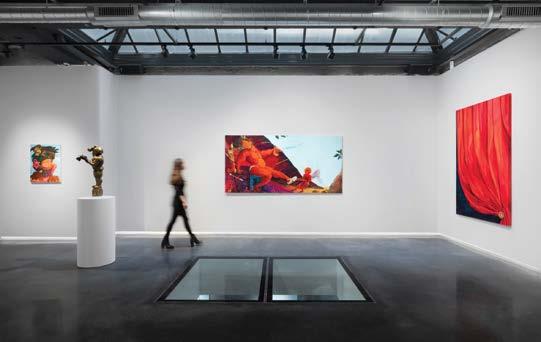
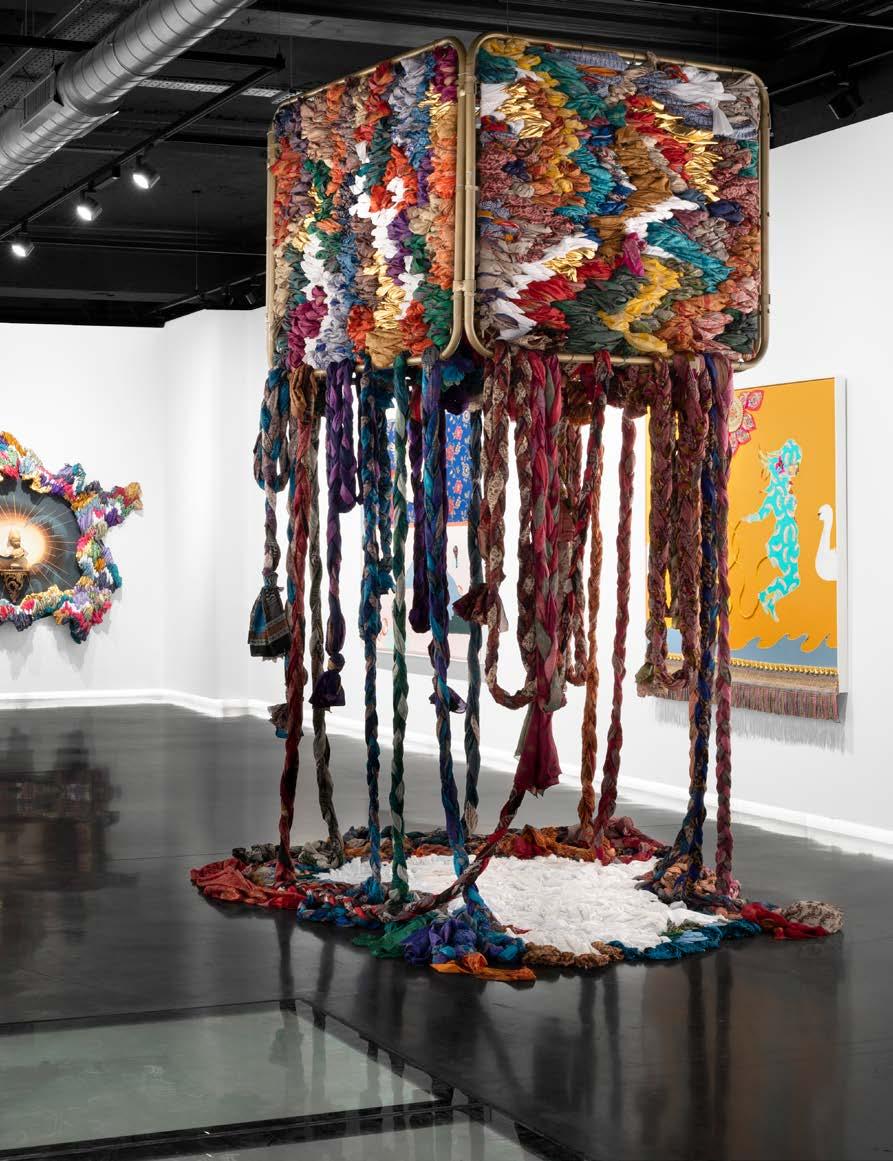
That DIY spirit was the perfect foundation for us to become compassionate leaders as the business grew.
Joe Kennedy
follows us, and the people we work with who make it all possible every day. And we’re proud that we’ve used our platform to give back: from charitable partnerships and fundraisers to our new artist residency, Dragon Hill, in the French Riviera - connecting art to real-world impact is an important pillar for us, and last year we established the UNIT Foundation, which engages our patron and collector networks to raise money for important social causes. We realise that we have a significant platform and we want UNIT ’s legacy to be in the positive impact it’s had on the world through arts and culture.
If you could go back and give yourselves one piece of advice at the start of this journey, what would it be?
Trust your instincts more. Don’t be afraid to challenge the systemeven if others say you’re too young, too naive, too ambitious. The art world, like every creative market, rewards authenticity, eventually. And - always - be patient!
What’s next for UNIT Gallery?
We’re building a cultural ecosystem. In 2025 and beyond, UNIT is no longer just a gallery. It’s a platform for discovery, a community for creatives, and a force for cultural impact. The gallery becomes just one aspect of what we do, through which we mount exhibitions and manage collections. Through the UNIT Foundation, we’re transforming cultural capital into real-world impact. With UNIT+, our new membership programme, we’re opening doors for the next generation to access and engage with the art market. Voices, our magazine, celebrates global talent and thoughtful expertise, amplifying creativity with a conscience. And at Dragon Hill our artist residency and sculpture garden set within a 1964 Jacques Couelle ‘landscape house’ in the South of France—we offer artists the freedom to dream, explore, and create without pressure. This is the first of a network of residencies in iconic properties that we are developing in the coming yearscombining historical narratives, hospitality, architecture, and art. The next chapter is about depth, impact, and legacy - without losing the spirit of rebellion that started it all!
Events Roundup September 2024 - July 2025

Chiswick Book Festival 15 September, 2024
Chiswick Book Festival guests joined us to hear historian and Latymerian, Taylor Downing (1971), Latymer parent, Christine Gregg and Latymer Alumni Relations Manager, Siân Davis speak about the making and editing of Latymer 400 – a beautifully illustrated book that marks 400 years of the Latymer Foundation which Edward Latymer established in 1624. They offered fascinating insights into the process of bringing Latymer 400 to life –from uncovering archival treasures and curating historical narratives that honour the school’s legacy.
Latymer 400 is a collection of entertaining essays written by alumni and staff members, both past and present - many readers likely encountered the familiar names of former classmates and teachers throughout the book. Historians, journalists, authors, designers, and photographers from our community helped chronicle the ups and downs and the various challenges the Foundation faced in establishing and running our schools – and, of course, the colourful characters who shaped our destiny along the way. Please scan below to purchase your copy


Inspiring Minds Campaign Celebration 24 September 2024
Thanks to the unwavering support of our entire school community, we were thrilled to announce that we had achieved our ambitious goal: 1 in 4 Latymer Upper School students are able to be supported by a bursary.
Those who attended our Inspiring Minds campaign celebration had the privilege of hearing from some of our former bursary students about how a Latymer education had transformed their lives.
This 10-year campaign made Latymer one of the most socially inclusive independent schools in the UK, and we couldn’t be prouder. Thank you to everyone who was part of this remarkable journey!
60th Anniversary of the Latymer Boat House 26 September 2024
March 2024 marked 60 years since the Latymer Boathouse first opened
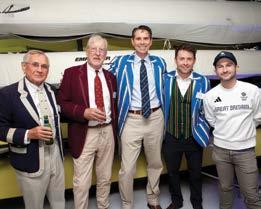
its doors in 1964. To celebrate the anniversary, a special gathering was held at the boathouse, bringing together alumni, former rowing captains, parents of current rowers and coaches. Though it was damp and dark outside, the atmosphere inside the boathouse was vibrant with club blazers and filled with the energy of rowers spanning generations. Among the attendees were three Olympians: Jim Clark, (Former Coach), Richard Phelps (1983), and Henry Fieldman (2007), who had recently returned from Paris 2024.
During the speeches, tribute was paid to the vision and determination of Latymer parents from the 1960s, whose belief in the value of a strong rowing programme led them to fundraise tirelessly until the Boathouse became a reality. Thanks to their legacy, rowing at Latymer continued to thrive, and efforts remain focused on keeping it accessible to every student with the passion to participate.
For those interested in supporting the future of rowing at Latymer, please contact Jo Ingram at jci@latymerfoundation.org
111th Latymerians’ Dinner 10 October 2024
Latymerians gathered once again for one of the school’s longest-running traditions - the Annual Latymerians’ Dinner. Held in the evocative surroundings of the Main Hall, the

evening brought together alumni from across generations to share good food, great company, and fond memories. With 170 Latymerians in attendance, it was the most wellattended dinner in recent years, with many guests travelling from around the world to be part of the occasion.
We were especially grateful to our guest speaker, David Cressy (1963), who delivered a fascinating talk titled “The First Poor Boys and Their World.” His insights into a period of history from 400 years ago offered guests a deeper understanding of the origins and legacy of the Latymer Foundation.
The evening also saw the revival of a historic tradition – the ‘Shuttlecock Challenge.’ As Alan Pinnock (1945) explained to guests, the game dates back to pre-WWI, when badminton was played in the Main Hall by his father, George Pinnock (1916). The challenge involved hitting a shuttlecock up to the rafters – an almost impossible task, as our Head, Susan Wijeratna discovered firsthand when she gave it a try!
Class of 1974 Reunion
6 December 2024
We were thrilled to have 27 members of the Class of 1974 join together for their 50th anniversary reunion. After sharing stories and reminiscing in the Latymer Archive, the group enjoyed a nostalgic school tour – a literal walk down memory lane!

After the tour, attendees gathered to celebrate and reconnect more over drinks and dinner at a venue close to school.
Festive Wreath Making Masterclass 7 December 2024
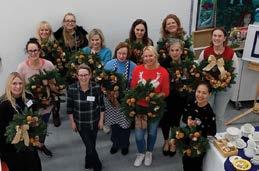
Our third annual festive wreathmaking masterclasses were a merry success. We’re incredibly grateful to Latymer parent and master florist, Becky Hands-Wicks for her expert guidance and enthusiasm in leading these events. The proceeds from the masterclasses, which raised over £2,500, went to the Prep Bursary Fund. Keep an eye out for next year’s classes!
Final Celebration of the 400th Year 12 December 2024
Our 400th Anniversary Year concluded with a spectacular finale! A record number of guests gathered in the Piazza for a festive welcome reception, enjoying a glass of fizz and seasonal treats to the cheerful sounds of Christmas carols.
We were honoured to have Latymerian and MP for Hammersmith and Chiswick,
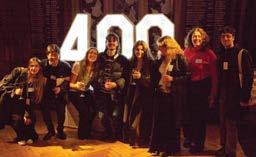
Andy Slaughter (1978), unveil our 400th Commemorative Plaque before moving into the warmth of the Main Hall to hear Head, Susan Wijeratna and Executive Director of the Latymer Foundation, Amanda Scott pay tribute to the school’s rich history, vibrant present, and exciting future.
Speak French like a local: phrases to impress your friends with Peter Winter 23 January 2025

Former Latymer Head and French Teacher, Peter Winter’s online talk was a delightful blend of his characteristic wit and wisdom, leaving over 40 alumni armed with a newfound appreciation for the beauty and nuance of the French language. A special ‘Green Room’ gathering was held before the event where those who joined could catch up and reminisce with each other and Peter.
We’re deeply thankful to Peter for generously sharing his time and expertise over the years in support of the Bursaries Appeal.
On the Road: Durham, Edinburgh & Bath February 2025
In February, our Alumni Relations Team once again hit the road - this time to Durham, Edinburgh, and Bath - where they were delighted to reconnect with Latymerians over tea, cake, and evening drinks. These gatherings offered a fantastic

opportunity to rekindle school ties and network with fellow Latymerians living, studying, and working in each city.
In Durham, we enjoyed catching up with 10 alumni of all ages during a cosy afternoon tea, followed by a relaxed evening reception at The Indigo Hotel and Swan & Cygnet.
In Edinburgh, we were thrilled to welcome 34 Latymerians for a delightful afternoon at The Balmoral Hotel, rounded off with a lively evening gathering at The Rabble Tap House.
In Bath, it was a joy to reconnect with 38 alumni—many of whom we hadn’t seen in years - over tea and cake at The Royal Crescent Hotel, followed by an enjoyable evening at The Bath Brewhouse.
Networking: The Startup Social 6 March 2025

The first of two networking events, we welcomed alumni at The View, County Hall in central London for an inspiring evening of entrepreneurial spirit and connection. The event brought together Latymerians across generations - those just beginning their professional journeys and others already established in the world of start-ups and innovation. The evening began with five introductory speakers who shared their diverse experiences navigating the entrepreneurial landscape: Jon Baines (1984), Hannah Chappatte (2015), Ollie Gold (2008), Warren Johnson (current parent), and Sam Smith (2014). Their candid reflections on risk-taking, resilience, and lessons
learnt provided valuable insights setting the tone for a great evening of connection and conversation. Alumni then connected over drinks, exchanged ideas, and built relationships with fellow Latymerians equally passionate about new business and innovation.
Networking: Sports, Media and Entertainment 18 March 2025

Latymerians with an eye on the dynamic worlds of sport, media, and entertainment gathered for a vibrant evening of conversation and connection at our latest professional networking event held at Swingers Crazy Golf, owned by Jeremy Simmonds (2001). Whether attendees were just beginning to explore a career in these sectors or were already seasoned professionals, the event offered a valuable opportunity to exchange ideas, make new connections, and gain industry insights.
Keynote speakers, Joe Markowski (2006), Leo Thompson (1998), Mike Cooper (1979), Tessa Ingham (Current parent), Annamarie Phelps (Former parent), Shabs Jobanputra, (Current parent) and Annabel Jones, (Current parent) shared their personal stories and professional insights painting a compelling picture of the challenges and rewards of working in these fast-paced sectors - and set the stage for a lively evening of networking.
Guided tour of the Imperial War Museum with Taylor Downing (1971)
22 March 2025

Once again, Latymer alumni and friends were treated to an exceptional - and now firmly sought-after tour of the Imperial War Museum hosted by Taylor Downing (1971), renowned historian, author and awardwinning TV producer.
With his deep knowledge and engaging storytelling, Taylor led a group of 25 alumni on a captivating journey through the museum’s remarkable collection. Taylor shared little-known wartime stories and behind-the-scenes insights on how major events have been represented in film and media. Attendees were guided through the exhibits with thoughtful commentary and anecdotes that added both personal and historical depth to the experience.
Guests wrapped up with drinks at a nearby pub, offering attendees the chance to reflect on the tour, catch up with fellow Latymerians, and enjoy relaxed conversation with Taylor himself.
We’re incredibly grateful to Taylor for once again giving his time and expertise in support of the Bursaries Appeal.
Annual Boat Race 2025 13 April 2025
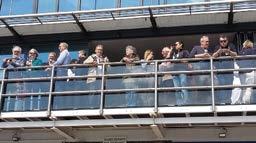
It was a wonderful afternoon on the Thames as alumni and current parents gathered at the Latymer Boat House with one of the best viewing spots in London to watch the 170th Men’s and 79th Women’s Annual Boat Race. With clear skies and a thrilling line-up, the event was made even more special by the strong Latymerian presence on the water.
This year’s Boat Race featured no fewer than five Latymerians competing across various races:
■ Carrie Rijske (2021) stroked the Cambridge Women’s Reserves, Blondie
■ Daniel Orton (2023) coxed the Oxford Women’s Blue Boat
■ Matt Morgan (2019) rowed in the bow seat of the Cambridge Men’s Reserves, Goldie
■ Dylan John (2021) captained the Oxford Lightweight crew
■ Henry Fieldman (2007) claimed victory for Cambridge in the Veterans’ Race.
Their achievements on such a prestigious stage are a testament to Latymer’s thriving rowing programme. Addressing the gathering, Head, Susan Wijeratna, shared how proud she is of rowing at Latymer and of the School’s commitment to becoming the go-to place for aspiring young rowers. She spoke of the recently launched LUSBC Rowing Fund, which aims to ensure that every student, regardless of background, has access to top-quality coaching, equipment, and opportunities on the water. If you’d like to learn more or support the Rowing Fund, please contact Jo Ingram at jci@latymerfoundation.org.
1624 Society Afternoon Tea 15 May 2025

It was a pleasure to welcome nearly 50 members of the 1624 Society back to Latymer for our much-loved annual tea. Hosted by Susan Wijeratna, Head of Latymer Upper School, and James Graham (1976), President of the 1624 Society, the gathering took place in the welcoming surrounds of Latymer’s Sixth Form Common Room.
Guests enjoyed an upbeat recital by some of our Year 7 musicians followed by a delicious spread of cakes, scones, and sandwiches while hearing updates about the School, as well as reflections on the growing impact of the 1624 Society and legacy giving at Latymer.
Legacy support has long been a vital part of Latymer’s story, and the 1624 Society honours those who have chosen to leave a gift in their will to the School. These meaningful commitments help safeguard Latymer’s future - and bring us ever closer to achieving our goal of becoming a truly needs-blind school.
This year, we were delighted to welcome 19 new members to the Society. In total, there are now 150 living members, with 251 members overall, including those who have since passed away.
To those who were able to join us: thank you for making it such a special afternoon. And to those who couldn’t attend – you were missed, and we hope to see you next time.
The 1624 Society celebrates those who have pledged a legacy to Latymer. If you would like more information, please contact Verity Mynors at vem@latymerfoundation.org.
Class of 2015 Ten Year Reunion 23 May 2025
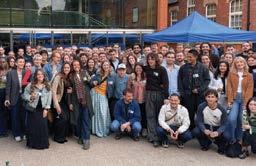
What an incredible evening - over 80 former students, along with dedicated current and former teachers gathered in the piazza to celebrate the 10 year anniversary of the Class of 2015. The air was filled with laughter, stories and unforgettable moments as everyone caught up, reminisced and rekindled old friendships. We’re especially grateful to those of you who travelled from outside London – or indeed the UK!
Old Latymerians Cricket Week
25 May - 8 June 2025

Our Wood Lane playing fields were alive with activity for the 2025 cricket season. Over the course of three consecutive weekends, we welcomed players of all ages and skill levels - from seasoned cricketers to enthusiastic newcomers for a spirited celebration of the sport. Halftime afternoon teas offered the perfect opportunity for players and spectators alike to relax and socialise. Please contact latymerians@latymerfoundation.org

if you would like to join the Old Latymerians Cricket Club!
Fuller’s Brewery Tour and Tasting 5 June 2025
30 guests including two Latymerians - Mark Bottomley (1976) and Jonathan Tafler (1976) joined us for a glimpse into the past and current practice of brewing at Chiswick’s very own Griffin Brewery. After the tour we had the pleasure of tasting all of Fuller’s beers and ciders!
Our warmest thanks go to former Latymer parent, Caroline Simonds, for giving up her time to share her encyclopaedic knowledge of brewing - from mash to cask and everything in between! We are also grateful for our guests, whose support for this event raised over £1,000, towards the Bursaries Appeal.
Online Talk: Curriculum Reform at Latymer 11 June 2025
Earlier this year, Latymer took a bold step forward in curriculum reform for 14–16-year-olds, leading the way with an innovative and forward-thinking approach to these crucial middle years of education. At the forefront of this initiative was one of our own – Latymerian and Assistant Head, Charlie Ben-Nathan (1990).
In a special one-off online talk, Charlie offered an insightful and engaging look into the ideas and research underpinning the school’s ambitious plans. His presentation explored the motivations behind moving away from the traditional structure of GCSEs, and how the new curriculum aims to prepare students more comprehensively and thoughtfully for A-levels and life beyond the classroom.
Latymer’s pioneering reforms quickly caught the attention of the wider education community, earning praise from fellow Heads, teachers, parents, students, and even policymakers. It was a remarkable opportunity for alumni to gain first-hand insight into the educational transformation taking place at their former school – a true moment of history in the making. If you’d like to hear a recording of this talk, please contact events@latymerfoundation.org
18 June 2025
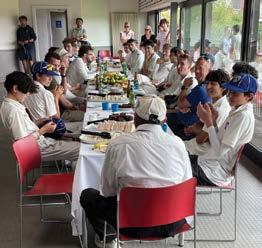
This year’s Heads 1st XI cricket match, the flagship event of Cricket Week, offered a wonderful day of cricket and sunshine. Alumni, students, and staff gathered to enjoy the sport and celebrate Latymer’s cricketing spirit.
After lunch, we recognised our outstanding players with the Robert Orme Award and the Daniel Levy Trophy.
Leadership List Reception 19 June 2025
Susan Wijeratna, Head of Latymer Upper School, and Andrea Rutterford, Principal of Latymer Prep School, warmly welcomed guests to a special drinks reception, held in recognition of their outstanding support shown to the Latymer Foundation over the past year.
It was a relaxed and celebratory evening, bringing together members of the Latymer community whose time, knowledge, and generosity have made a meaningful impact. Guests enjoyed drinks and conversation in Latymer’s beautiful Prep Garden, with plenty of opportunities to reconnect, reflect, and celebrate the achievements made possible through their support.
1950s - 1970s Archive Photo Recognition 25 June 2025

We welcomed two groups of eight enthusiastic alumni volunteers to the Latymer Archive for a special photo identification session. The aim was to uncover the stories behind a remarkable collection of photographs taken between 1950 and 1979 – a pivotal period in the school’s history.
Held in the morning and afternoon, the sessions offered a nostalgic trip down memory lane, as volunteers pored over decades-old images, sharing memories, identifying faces, and recalling key moments from their schooldays.
Thanks to the invaluable insights and stories shared by our alumni, we were able to enrich our historical records and add important context to this treasured part of the Latymer collection. It was a thoroughly enjoyable and productive day, and we are deeply grateful to those who took part.
Henley Royal Regatta 2025 1 - 6 July 2025

Henley Royal Regatta is one of the most prestigious rowing regattas in the world and a highlight of the Latymer summer sporting calendar. The celebrations got off to a great start with a series of events, beginning with a lovely brunch generously hosted by Adam Toop (1984) at his home. Next up was our ever-popular Henley Afternoon Tea, organised by Latymerian, Olympian and Henley Chair Richard Phelps (1983). After six exciting days of rowing, we wrapped things up with our annual Henley BBQ – a fantastic way for alumni and current Latymer rowers to come together and celebrate.
Head’s 1st XI Cricket Match and Lunch
A Special 400th Anniversary Founder’s Day at St Paul’s Cathedral
by Paul Goldsmith, Teacher of Economics, Politics & World Perspectives, and Sixth Form Tutor.

15 October 2024
From the moment I arrived at Mansion House Station and saw the sign from London Underground congratulating the School on its Founder’s Day 400year Anniversary, I realised that this was going to be no ordinary day.
Sixth Form tutors had been encouraged to meet their form groups for breakfast and walk together towards the magnificent St Paul’s Cathedral, which loomed gloriously in the distance, framed as it was by a clear blue sky.
What was particularly special about that walk was seeing the coming together of Latymer students and teachers from all directions into the gated compound in which the Cathedral sits.
I was determined to be mindful of the sights and sounds of the day,
and the sight of hundreds of people I share my life with all in one place, looking smarter than usual, was striking. Even more striking, of course, was the sight of the inside of the Cathedral, which is stunning.
Nothing prepares you for the size of the place, combined with the beautiful decorations and ornate carvings all around. I am old enough to remember Lady Diana Spencer being walked down the same aisle by her Father to marry Prince Charles that I walked down to join my tutor group. To be there was awe-inspiring. As I sat waiting for what would be my fifteenth Founders Day service to start, I considered how lucky I was that Edward Latymer had had such a good idea 400 years ago. My children have had a first-class education at Latymer, with opportunities in and out of the classroom the children of a
teacher and writer can normally only dream of.
But also, because he was so determined to make a difference to the lives of the less fortunate, the ethos Latymer encouraged meant that I now have the honour and pleasure of teaching a diverse range of children. I looked around at the colleagues I love working with and the pupils I love teaching and supporting, and renewed my determination to make the most of these privileges.
The service itself was cleverly written. It combined a mixture of the modern with the traditional, the religious with the secular, and showcased what is so special about our community. It was such a lovely idea to have representatives of the diverse communities (religious and ethnic) within our school
to give a reading, and also to have representatives of different functions within the school (teachers, nurses, chaplains etc). The Lower School and Upper School choirs sang beautifully, and I must give special mention to Sixth Former Quentin, who took on an extremely tricky solo which must have taken a lot of practice to go with his undoubted talent. But of course, what is Founder’s Day without the hymns, and nothing would stop me belting out ‘Guide me O thou great redeemer’, ‘I vow to thee my country’, and finally ‘Jerusalem’ – the opening chords of which was greeted with the words ‘now THIS is a banger’ from the Upper Sixth boy next to me.
Overall, Founder’s Day 2024 was a day I will always remember. My deepest thanks go to the colleagues who made it happen, who managed an extraordinary organisational feat so well and gave us all the opportunity that everyone there will remember fondly. I have felt extremely lucky to be present throughout the 400th year of this great school.
Founders’ Day gave me the opportunity to give thanks, and I am extremely grateful to have done so in such magnificent surroundings.
Upcoming Events Dates for your Diary* September 2025 - July 2026

LUSBC Celebration
Thursday 18 September 2025
6.30-8.30pm
Following last year’s celebration of the Boathouse’s 60th Anniversary and the successful launch of the LUSBC Rowing Fund earlier this year, we invite our entire rowing community to join us once again for an evening of celebration.
Back to School Reception!
Thursday 25 September 2025
6.30-8.30pm

Susan Wijeratna, Head of Latymer Upper School, and Amanda Scott, Executive Director of the Latymer Foundation warmly invite you to a special evening of celebration, connection and community to mark the start of the new School Year. This is a wonderful opportunity for us to thank our incredible donors and supporters and share exciting plans for the year ahead. We look forward to celebrating with you!
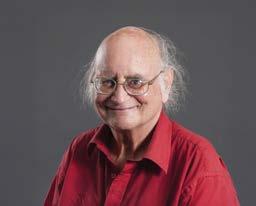
Saturday 27 September 2025
4-6pm
Robert Orme was one of our school community’s most cherished teachers. He taught at Latymer from 1967 to 2014 and, more recently, remained an active part of the Latymer community with his renowned online lectures.
4pm-4.30pm - Drinks in the Piazza (weather permitting)
4.30pm - Gather in the Main Hall to hear shared memories from Robert’s friends and former pupils
Following the speeches we will reconvene outside to share memories, reflect, and celebrate Robert’s remarkable life together.
For those unable to attend in person, we will record the speeches and send to our wider community after the memorial, along with a link to Robert’s memorable online lectures.
Class of 1985 Reunion (40 years!)
Monday 13 October 2025
4.30pm - 6.30pm
Can you believe it’s been 40 years since the Class of 1985 graced the Main Hall at Latymer? Latymerians Owen Francis (1985), John Matthews (1985) and Jonathan Lowy (1985), are planning a reunion reception back at school this autumn - an opportunity to catch up, share stories, take a tour, and celebrate

four decades of friendship. We hope as many of you as possible from the Class of 1985 can make it!
112th Annual Latymerians’ Dinner Thursday 9 October 2025 6.30-10pm

With a record breaking 170 guests in attendance last year and one of the longest-running Latymerian traditions, the Annual Dinner bagan 112 years ago. With the exception of two world wars and a covid-induced lockdown, Latymerians have returned to School each year to enjoy good food and great company in the evocative surrounds of the Main Hall.
We are thrilled to announce British rowing coxswain, World Champion and two-time Olympic medalist, Henry Fieldman (2007), as this year’s speaker at the Annual Dinner.

Please scan the QR code to find out more and register for any of our upcoming events:

On the Road: East and West Coast USA
Monday 13 - Wednesday 15 October 2025
Living or studying in the US? We’d love to see you at one of our ‘Meet the Head’ events this October - a special opportunity to meet our Head, Susan Wijeratna, hear updates from King St, and engage with our vibrant global community.
Kicking off with our East Coast event in NYC on 13 October, we’ll then be heading west for two events in California on 14 (NorCal) and 15 October (SoCal).
Combined Cadet Force (CCF) Lunch Meeting
Thursday 23 October 2025

Nearly six decades ago, Latymer’s Combined Cadet Force was disbanded, but the spirit lives on. Latymerians around the world still remember those days of marching down the central corridor in ammunition boots, and many continue to stay in touch. Now, for those who shared that experience - or simply wish to reconnect - you’re invited to a special lunch. Join us for
A Celebration of Robert Orme’s Life and Work
an afternoon of camaraderie, reminiscing and good company. For more information, please contact Ian Michell (1962) at wshe@btinternet.com
1975 Reunion (50 years!)
Friday 14 November 2025 6-8pm

It’s hard to believe it’s been half a century since the Class of 1975 walked the corridors of Latymer! To celebrate this incredible milestone, Latymerians, David Milne (1975), Joe Pitt (1975), and Brett Overin (1975), are planning a special reunion for their year group. We do hope you can join them back at Latymer for a memorable evening filled with nostalgia, laughter and reconnecting with old friends.
Autumn FundraiserSave the Date!
Wednesday 19 November 2025, 6.30pm-9pm
Details of our Annual Autumn Fundraiser will be up on the website soon - in the meantime, make sure to add the date to your diary!
Festive Wreath Making
Saturday 29 November 2025

Join us for a festive wreath-making masterclass! Now in our fourth year of hosting this ever-popular event, it’s a wonderful way to get into the Christmas spirit and craft your own beautiful seasonal decoration.
Latymer Christmas Carol Concert (1624 Society Members) Thursday 11 December 2025 6-7pm

We warmly invite our 1624 Society Members to St Paul’s Church, Hammersmith, for our annual Christmas Carol Service. Join us to enjoy an evening of music and festive cheer with multiple choirs and congregation carols to celebrate the spirit of the season.
Latymer On the Road: Scotland & Bristol Evening Reception Early February 6-8pm 2026

This February, the Latymer alumni team is hitting the road to visit university towns across the country. Whether you’re studying, working, or living nearby, we’d love for you to join us for a drink (on us!)—reconnect with old friends, make new connections, and share your latest news. If you have any great venue suggestions to host the reunion in either location, please get in touch with our events manager, Jo Ingram at events@latymerfoundation.org
Latymer On the Road: Scotland & Bristol Coffee Morning Early February 2026 10.30am-12pm

Join the Latymer alumni team this February for a relaxed coffee and catch-up at university locationswhether you’re an alumnus, student, or simply in the area, everyone is welcome! Come share stories, recconnect and hear what’s currently happening back on King Street.
Sipsmith’s Gin Tasting
Wednesday 4 February 2026 6.30-8.30pm

Join us this February at Sipsmiths in Chiswick for an exciting tour of the distillery and a gin tasting experience - perfect for exploring rich botanical flavours and celebrating the end of Dry January!
Schools’ Head of the River Race Friday 13 March 2026 12.30pm

Come and cheer on the Latymer crews as they take on the 4.2 mile course from Mortlake to Putney in the Schools’ Head of the River Race 2026. It’s a major event in the rowing calendar, attracting schools from across the UK and Internationally. Join us for a cuppa at the Latymer boathouse and support our talented rowers as they race along the river in this iconic race – a rowing tradition established 80 years ago in 1946!
Exclusive Imperial War Museum Tour
Saturday 21 March 2026
10am-12pm
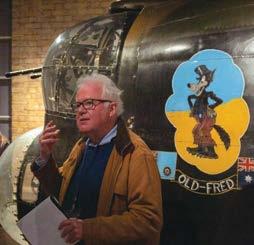
Join us for an exclusive guided tour of the Imperial War Museum. Gain a unique perspective on the history of warfare and hear fascinating stories brought to life by the expertise of historian and Latymerian, Taylor Downing (1971).
1624 Society Afternoon Tea (Members Only)
Thursday 21 May 2026
4.15-6pm

This wonderful annual event is hosted by James Graham (1976), President of the 1624 Society and the Head, Susan Wijeratna, for those who have included a legacy to the Latymer Foundation in their will. Interested in learning more?contact Jo Ingram at jci@latymerfoundation.org
2016 Reunion Summer Term

Can you believe it’s been 10 years since you left Latymer? So much has happened in the last decade, and we’d love to catch up! Join your fellow Latymerians, and some of your former teachers - for a special reunion in the piazza! If you’re from Class of 2016 and would like to help organise this reunion, please contact Sian at sdd@latymerfoundation.org
Leadership List Reception Thursday 18 June 2026
6.30-8.30pm

Many people choose to give £2,024 or more each year to the Latymer Foundation and so join our Leadership List. This generosity means so much to our community that members are invited to an exclusive evening of drinks, conversation and celebration, hosted by the Head. Interested in learning more? Please contact Verity Mynors at vem@latymerfoundation.org
Old Latymerians Cricket Club Sunday 7, 21 & 28 June 2026 10am-6pm
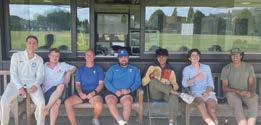
Our Wood Lane playing fields are gearing up once again for the 2026 cricket season! With fixtures lined up for next summer, there will be plenty of action. If you’re interested in signing up to be part of the Latymer team and take on old rivals, or to spectate with a cuppa from the pavillion, please get in touch with Rhianna or Sian from the alumni team on Latymerians@latymerfoundation.org
Join us in the Archive Summer 2026

Join our archivists, Polly Foley and Terry Scott to explore our archives and help identify the people and places captured in the many photographs. We’d also love to hear your insights and stories - so come along for a cup of tea and a biscuit!
Henley Royal Regatta Tea
Tuesday 30 June 2026 4-6pm

Henley Royal Regatta is one of the most prestigious rowing regattas in the world. Join us in supporting our Latymer 1st VIII crews at Henley and enjoy an afternoon tea hosted by Henley Chair, Olympian and Latymerian, Richard Phelps (1983) in the Stewards’ Enclosure, opposite the finish line.
Henley BBQ (Henley Cricket Ground)
Saturday 4 July 2026 12-2pm

Latymer’s lunchtime BBQ is a lovely tradition and a great way in which to celebrate six days of rowing! All our alumni rowing community, (their partners), and current and former coaches are invited to join the Boat Club and Alumni team for this relaxed and informal event.
(*dates correct at time of going to print)



By Madeleine (Year 12)
When we speak about competition and necessity, it is often in reference to the natural environment and the further challenges that human demand has generated. Yet, what about the threat within our own cultures? Can it be saved?
All with different dialects, origins, and rich histories - there are currently around 7000 languages spoken today. As globalisation offers efficiency and necessity for the benefit of some, it fights to cut down on human character for the ease of development and innovation. Mandarin Chinese has the largest proportion of speakers worldwide (given immigration and the size of the country itself), with Spanish and English following closely. Many others that make the Top 10 list, have done so through imperialism and the forced transfer of language, culture and religion to other countries. Along with time, the occurrence of people becoming bilingual and losing their ability and need to speak their native languages, has resulted in a definitive 573 languages becoming extinct.
A lesser known success story is found in Northern Europe, where indigenous tribes have slowly integrated with modern technology and lost representation of their heritage. Fortunately for the Sámi, they have been able to increase the number of Inari Sámi speakers. Taija Aikio, a spokesperson for Inari’s Siida Museum said “As many as nine Sámi languages are spoken across Scandinavia, Finland, and Russia…Three of these languages are spoken in Finland—Northern Sámi, Skolt Sámi, and Inari Sámi. All are endangered, and in the 1990s, Inari Sámi was almost gone.” In this decade, the number of speakers was around 350, it is now as high as 500.
Sápmi is the homeland of the Sámi people, stretching across Finland, Norway, Sweden and Russia. In the 17th century, Sweden’s colonial rule meant the implementation of taxation and Christian belief on the Sámi. Continuing to the early 1900’s, Finland’s independence generated less leniency and introduced compulsory education policies discouraging the teaching of Sámi languages - with boarding schools for Sámi children following suit.
Student Voices
Inari SámiThe (Near) Extinction of a Language

Returning to their homeland after displacement due to World War Two conflict, much of the land had been destroyed and several families chose to adopt the Finnish language as a way of surviving and rebuilding. Various artefacts were recovered (and remain protected in the Siida Museum, in Finland) yet oral communication is much harder to preserve. Whilst hundreds of people still communicated in Inari Sámimost were over the age of 70.
So how has Inari Sámi filtered back into younger generations, and how did a native Italian man become one of few foreigners to obtain a Master’s Degree in it? Well, two native speakers, Matti Morottaja and Ilmari Mattus are both responsible for this. Starting the Anarâškielâ servi (the Inari Sámi Association) and several language nests in nurseries. Language nests were created in the 1980’s by the Māori in New Zealand in an effort to save their own language. This is an education structure whereby children (ages 0 to 5) are taught the native indigenous language through immersion in the early stages of their education. Done before children go into institutionalised education, teachers will implement a curriculum which teaches basic letters/characters, words, etc as a safe psychological method of integrating the language back into society. For the Sámi
Sámi people dressed in gákti, their traditional clothing
people, there was a huge disparity between the number of adult and child speakers - which called for an influx of adults to get involved by learning it too.
Marja-Liisa Olthuis - a linguist and translator - immediately upscaled the current system. In 2007, she became the first person to defend a doctoral thesis in Inari Sámi and went on to develop a language education programme at the Research Institute for Languages of Finland. Her method is known as CASLE (Complementary Aanaar Saami Language Education) and gave fluency to several adults, helping to expand the number and effectiveness of language nests in Finland.
One of the reasons why the regrowth of the Inari Sámi language is so incredible, is its ability to use modern tools to achieve the tricky conservation of an indigenous language. For global availability of the language, as well as to encourage children to speak the language after the language nests - a daily newspaper, digital grammar and spell check technology and a growth and accuracy of Wikipedia content is in place. Anarâš Aavis is the only daily newspaper which contains all current events, affairs and news in the language. This includes articles about wildlife, carbon emissions and aerospace news. The digital
grammar and spell check technology has been created in partnership with The Arctic University of Norway, encouraging students outside of modern country borders (that still fall within the Sápmi territory) to value indigenous culture and history. Whilst Wikipedia information can be untrustworthy, over 6000 articles have been published in Inari Sámi that are easily accessible for the global population as well as current and native speakers.
In conclusion, several elements of indigenous culture are being and have been lost. The shrinking world effect and the increasing connectivity between countries in areas such as; cultural beliefs, technology, and active migration is removing a lot of need to pay attention to the past. Whilst much of our education encourages us to think about the future, it is equally as important to remember the personal significance that history has - not just for countries, but for indigenous communities that once covered (and still do cover) areas beyond borders. Artefacts (clothing, jewellery, food recipes) can be preserved but language is much more difficult. Being aware of this can help to understand the lived experiences of native communities and how it is possible for them to integrate with modern systems (the way the Sámi have) without entirely erasing history.
By Cameron (Year 13)
The decrease in the price of green energy is often trumpeted as a success story, a victory that soothes the mind of westerners just enough to let them go about their days guilt free. Though, there seems to be little thought put towards the thousands exploited and killed in an attempt to rush ahead to a ‘clean’ world. From the global economics surrounding this energy, to the modern day slavery in central Africa that fuels these leaps, this article will attempt to shine light on the human cost we pay for moral purity.
It is also worth noting that I am not in any way discouraging the rapid movement towards green energy, but rather criticising the failures of global organisations and governments to properly regulate firms to prioritise ethical energy over cheap energy. A failure that has resulted in immense bloodshed.
Changing Prices
Global energy prices have fallen dramatically over the past two decades, as shown below; to the point where some forms of renewable energy are cheaper than coal and gas (depicted in black and green respectively).
This rapid decrease in price comes from an even faster increase in the supply of these types of energy. Government funded innovation and investments through initiatives
Green Energy, Green Money, Red Hands

such as the inflation reduction act, signed by Biden in 2022, have led to massive steps forward in the production of green energy. A primary example of this is wind, where US wind energy generation quadrupled between 2010 and 2022.
While this sounds great, solar panels, electric car batteries and a multitude of other technologies that aid the production and consumption of green energy require precious resources such as cobalt. In fact, the consumption of cobalt is so intensely focused on this industry that an estimated 195,000 tonnes

Congolese Cobalt
Though, there is a problem. Over 70% of the world’s cobalt is mined in the Democratic Republic of the Congo; a country where over 400,000 work in modern day slavery, with a large portion of these workers in the mining sector - the country’s main industry, comprising 90% of its exports. In these mines, temperatures are high, breaks are few and far between, and abuse is frequent. 2,000 people die each year in cobalt mines; much of this is unreported.
These mines are also rampant with child labour; out of the 255,000 Congolese workers mining cobalt, at least 40,000 of them are children, very few of whom earn more than $2 a day - a wage below the poverty line.
The intensive use of cobalt in the renewable industry and its bloodstained roots leave me astounded that the world continues to use the term ‘clean energy’; a near ironic attempt to absolve
itself from the bodies left by these horrific practices.
Exploitation in the DRC
This is not a one time problem though. The systemic economic exploitation of Africa has been prevalent since Romans colonised the northern continent, with the latest successor to the reigns being China, asserting itself as western prevalence left the region. Different to the hard power that Africa has previously been ruled by, China’s strength comes in a different form - money. Lending the African continent over $200b between 2000 and 2023, leaving it struggling to pay back loans. In the case of the DRC, due to its poor financial situation, loans are paid back in the form of discounted natural resources. Much of this is unsurprisingly cobalt. Mining companies, backed by Chinese banks have seized mineral deposits multiple times, with many suggesting that these will be used to boost China’s growing EV market. All whilst Chinese militia groups have also seized control of mines in the country, sending a clear message to the government in Kinshasa that Beijing views these resources as their own.
of the 250,000 tonnes of cobalt mined in 2023 were used to produce electric car batteries.
A house marked for eviction to expand an energy transition mine, Kolwezi, DRC
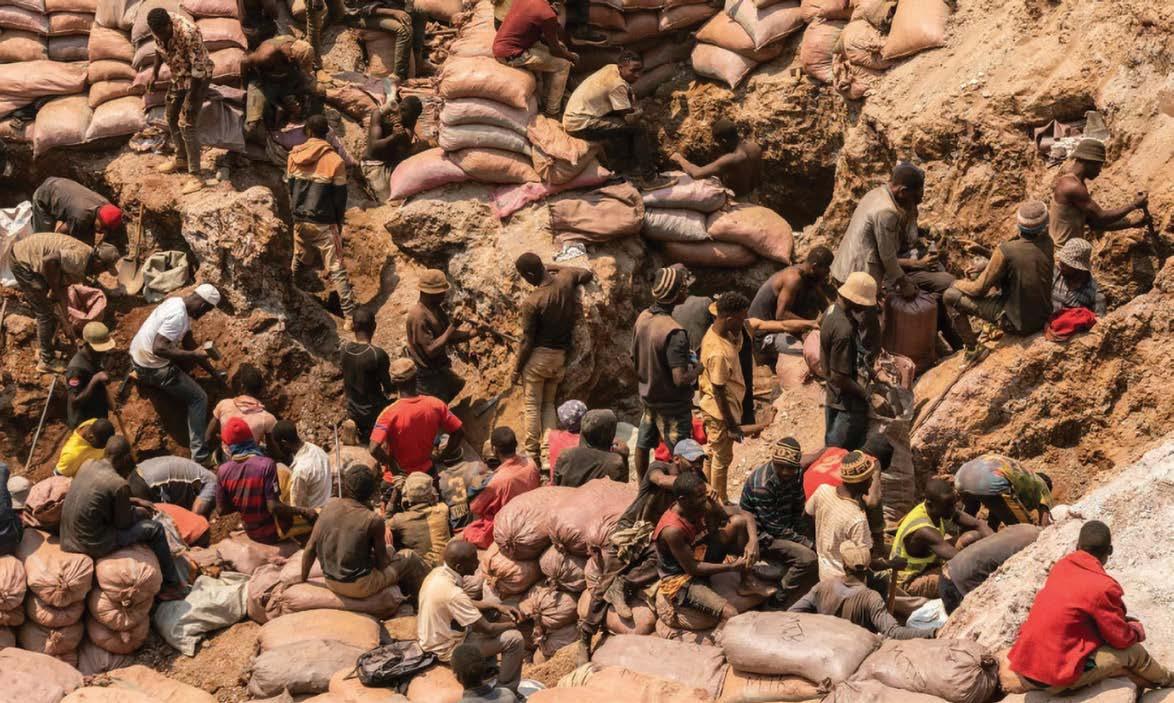
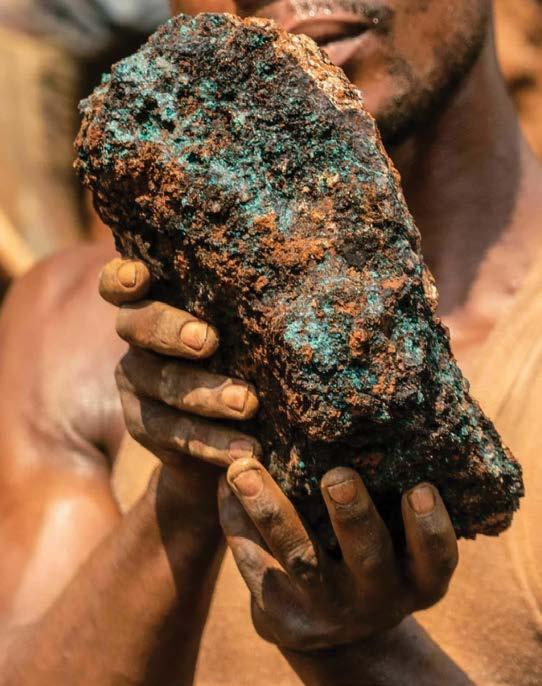
Though, what is the country to do?
One of the poorest countries in Africa, as China exploits its natural wealth and Rwandan groups wage war in the south, the DRC is in such a weak position that the further exploitation of its natural resources to fund the climate movement is the metaphorical ‘nail in the coffin’.
A Path Forward
The push for green energy is necessary, though it should not come at the expense of the vulnerable. Governments, corporations and international organisations must take responsibility to ensure that supply chains are scrutinised and that the
companies profiting from these practices are held accountable.
While it is easy to ask firms to source ‘ethical’ cobalt away from this exploited region, it is simply not feasible. The second largest producer of cobalt in the world is Indonesia, followed by Russia, both producing 7% and 4% respectively, a tiny portion, and simply not enough to sustain the renewable movement.
Therefore, it is the job of the UN and other international bodies to uphold human rights and end the brutal exploitation and careless bloodshed that is so closely tied to this industry that the world so desperately needs.

is Trump’s foreign policy a mistake? Soft power -
At the time of writing this article (March 2025), President Donald Trump has been in office for just over two months, and the scale and number of changes he has made in all aspects of government have had great impacts on the United States itself and the rest of the world. Domestic policy aside, his foreign policy has had numerous consequences. It has affected billions of people, which is not an exaggeration. The US is a dominant force of global economics and politics and what Trump does has ramifications for ordinary people in other countries across the world. And that is exactly why what Trump is doing might just be a huge mistake, despite his insistence that he will put the US first. The US has cultivated soft power for approximately 80 years. Soft power is defined as “a persuasive approach to international..., typically involving the use of economic or cultural significance.” What Trump
is doing is stripping the soft power that the US has, which may have severe long-term consequences.
Trump’s first major shift to foreign policy was tariffs. This is not something new - he implemented them in his first term, predominantly against China. The difference this time is the inclusion of significant tariffs on nations generally considered allied with the US. He has imposed tariffs on China again, but this time Canada and Mexico have also been hit with major tariffs. Along with his global tariffs on steel and aluminium, Trump has placed a 25% tax on all goods coming into the US from Canada and Mexico. Impacts on those nations aside, this is affecting the people of the US and the United State’s global reputation. As mentioned before, the cultivation of soft power by the US has unquestionably placed them as the global superpower of the modern day, at least for now. They have done
this by forging strong alliances with the ‘western’ world and encouraging free trade and democracy. Trump has now torn up the free trade agreement with Mexico and Canada, and levelled tariffs on Europe. This has irreversible effects - why should these countries continue to trade with the US in the same way? If the US ceases to become a reliable trading partner, these nations have other places to turn to. Of course this would not be cheap or quick, as many economies are deeply entrenched in a trade system with the US because of geographical positioning and their political affiliation - looking at Canada, 77% of their exports go to the US and 63% of their imports come from the US. However, change will still be happening and as a result the US loses its stable position as a trading partner. Trump might advocate for an isolationist foreign policy, but the US is far, far too entrenched in global economic systems to survive
By Billy (Year 12)
a loss in trade. Global influence and status are one of the most valuable assets a country can have, and Trump is electing to throw them away for short-sighted goals and what is effectively bullying.
The next of Trump’s controversial changes to foreign policy is aid. The administration has frozen almost all international aid, managed under USAID, (United States Agency for International Development) while it supposedly aims to increase its efficiency and remove fraud and mismanagement. This has led to thousands of people being fired or placed on leave. In fact, less than 3% of employees are estimated to have not been affected, and this is just in the US. It’s virtually impossible to quantify the losses in jobs due to funding cuts to the multitude of NGOs funded by USAID, let alone the humanitarian costs for governments and communities relying on the aid programmes to




carry out important projects to improve global health and equality. Again, it would take far too long to consider all the consequences this decision has on the nations receiving aid, so instead the focus will be on how this actually affects the US. To really understand how significant this change is, the history of the US’s aid programmes needs to be considered. They’ve invested trillions of dollars and countless programmes in virtually every continent in the world. What this investment has done for the US is help to establish it as a global superpower and exert this soft power. This allows American governments to push their agenda and create strong relationships with other states that benefit them. Trump’s decision to scrap the scheme entirely is another irreversible act, just like trade. Many countries will suffer greatly with lack of aid and a decrease in quality of life. In the long-term though, countries will look for other sources of aid or become more self-sufficient. Looking at Africa, China is already a major player there and the US’s retreat in development only opens the
door further. Europe could feasibly also step in to an extent and form bonds with countries who require aid. It is all well and good for the US government to not want to be responsible for the rest of the world’s development, but eventually they won’t have such influence on the global stage. Perhaps Trump does not care about this but withdrawing from international cooperation in a globalised socioeconomic landscape has negative ramifications for the public and the government’s ability to actually create deals that benefit their population in the future.
The final change to foreign policy, and one that has been dominating international news for many weeks, is the change to the stance on conflict. Prior to Trump’s ascent to presidency, the US was spending huge sums in Ukraine and Gaza. In Ukraine the figure is not quite as ludicrous as Trump’s 300 billion USD claim, but nonetheless the US has spent at least 120 billion. Meanwhile in Gaza the US has funded at least 22 billion USD to the Israeli government in military operations, and 2.1 billion USD
in humanitarian aid. However, since Trump has gained power, he has been pushing for resolutions to these conflicts - and not ones that reflect particularly well on the US. Going through the mass of events that have taken place would take a long time, and is also not relevant to answering the question. What is important is the response to the decisions and how this bodes for the US. One consequence is to make many European leaders question Europe’s ability to actually rely on the United States for military aid and security guarantees. Germany has just announced a massive increase in military spending by making it exempt from its debt rules, which are very strict. Likewise the Labour government in the UK has pledged to increase defense spending to 2.5% of GDP by 2027. These are bold moves, but if they pay off they make Europe less reliant on the US. Maybe this is a win for Trump - he does hold the view that the US should not have to be the global policeman. However, the US has benefited from being the policeman of the world. It has allowed them to intervene in conflicts and shape
power - is Trump’s foreign policy a mistake?
them to their liking, and gain resources and political agreements in return for military aid. The really important thing here is that despite its power, the US cannot truly hope to survive alone and retain equal economic status. What’s the point of spending nearly a trillion dollars on defense if you aren’t going to do anything with it? Military power is enormous, and it bends countries to the US’s will significantly. Opting out of spending on international conflicts damages the groups in the conflicts, of course, but in the long run there is good reason to think the US will also suffer.
A lot of this is very speculativethere is no way to tell what will really happen to the US over the next few years, not least because of the sheer unpredictability of Donald Trump. Nonetheless, there is plenty of reason to think that these drastic changes in foreign policy will have negative impacts on the US. We can only really wait, and hope that the rest of the world can adapt to a globalised society in which the United States is not at the forefront.
Latymerian Legacies
What Makes You Proud to be a Latymerian?
As we celebrated the close of our 400th Anniversary, we shared a special brochure exploring the power of legacy giving and invited you to reflect on what makes you proud to be a Latymerian. The responses were as rich and varied as our community itself.
From sporting triumphs on the river and pitch, to the academic foundations laid in classrooms, the ethos of the school, and the bonds formed with classmates and teachers, it’s clear there is much to be proud of when looking back on your Latymer days.
Some memories came up time and again — the thrill of the Jantaculum, the mischief of the playground, a rebellious streak that crops up in every generation. What shone through most, though, was the Latymer spirit: bold, curious, independent-minded, and just a little bit cynical.
This character is no accident. It is shaped by a vibrant, diverse student body — a mix that has always been central to Latymer’s identity. When Edward Latymer left provision in his will for the education of “eight poore boyes,” he set in motion a tradition of generosity and community mindedness that continues to this day.
Thanks to this generosity over the course of our 10 year Inspiring Minds campaign, hundreds of bright, talented students have been able to make the most of a Latymer education, regardless of financial circumstance. Legacy gifts play an increasingly important part in making this possible.
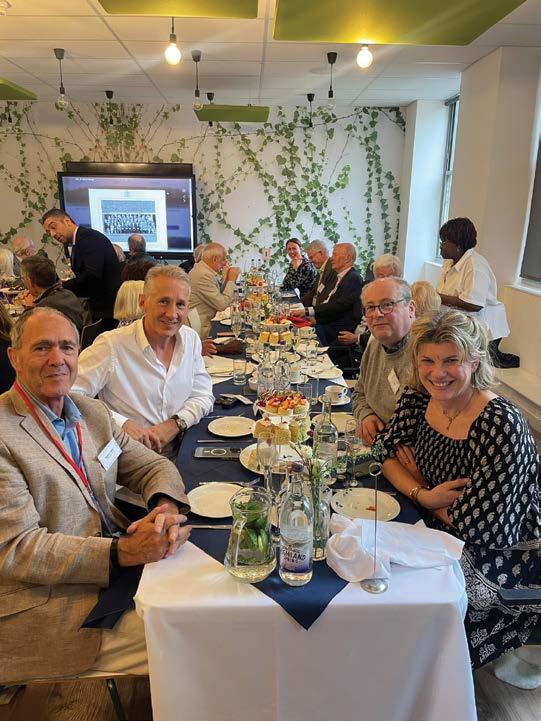
During and in the wake of our 400th Anniversary celebrations, we have seen an outpouring of support through legacy giving. This year alone, we have welcomed 20 new members of our 1624 Legacy Society, an unprecedented number since its foundation 20 years ago. With a total membership of 258 Latymerians, parents and staff members, both current and former, our community of legators has never been stronger.
We were delighted to welcome 47 members of the 1624 Society back to Latymer this May for our annual Afternoon Tea — an occasion filled with reconnection, shared memories, and joyful conversation. Guests were treated to a vibrant musical recital from students across the age groups, ranging from classical piano solos to a dynamic performance by one of our Year 7 bands.
But our relationship with our legators extends far beyond celebratory events like the Tea. We deeply value the wisdom and experience of our alumni, and the vital role they can play in helping to shape the future of Latymer. As part of this ongoing legacy, members of the 1624 Society have been invited to join us at key
moments throughout the school year — including our annual Carol Service at St Paul’s Hammersmith, and a recent talk by Assistant Head Charlie Ben-Nathan (1990), who shared exciting plans for our upcoming Middle School Curriculum Reform. It was a privilege to hear the thoughtful reflections and insights of our alumni, whose perspectives continue to influence and inspire the next chapter of Latymer’s story.
As we heard at this year’s Tea, the sustained impact of legacy giving is clear. In the 2024/25 academic year alone, gifts received through bequests have fully funded one bursary position at Latymer in perpetuity –meaning that this place will always be open to a brilliant, eager and potential filled young person for the generations to come. These gifts have ranged from a single percentage residuary to the full value of an estate, but each bequest has had a lasting and meaningful effect and each legator has left a permanent mark on the fabric that makes Latymer so special.
By remembering Latymer in your will, you can help ensure that future students experience the same educational opportunities,
extracurricular pursuits and lifelong friendships that so many of you recalled in your replies. It’s a way to honour the past, while investing in the future — and to keep the spirit of Latymer alive for generations to come.
If you’d like to learn more about legacy giving, the difference these gifts can make or the financial and tax benefits of leaving a gift in your will, please don’t hesitate to reach out to Verity Mynors on vem@ latymerfoundation.org.
As we look to the future, the voices of our community remind us why this work matters. We are pleased to share perspectives from those who have experienced, enabled and supported the transformative power of legacy giving.
“The idea of connection and shared identity has been central to Latymer from the very beginning. In 1624, the same year that Edward Latymer made his will, his friend and vicar, the poet John Donne, wrote, “no man is an island, entire of itself; every man is a piece of the continent.” I have always felt that Donne’s words have resonated through Latymer’s halls, reminding us that community is at the heart of who we are and what we do. Legacy gifts are a way of preserving and
advancing this tradition, ensuring that future generations can benefit from the opportunities and sense of belonging that we enjoyed.” –James Graham (1976), President of the 1624 Society
“The gift of education has a permanent impact on the lives of recipients; not just their lives, but future generations.
As a direct grant pupil in the 1960s, I was able to attend the school at a time when my parents would not have been able to afford the fees. Latymer had a profound and lasting impact on my life. Its unique blend of creative energy, intellectual curiosity, and encouragement of independent thought determined my attitudes and outlook. It was also great fun, and I made friends for life.
I began supporting the bursary scheme at Latymer about 20 years ago and later amended my will to leave a specific bequest to the school’s foundation. I know that an education changes the course of a child’s life, and one only has to read the letters written by bursary recipients, as they head into the future at the end of their time at the school, to appreciate what the gift of education has meant to them.” – Stephen Hodges (1972), Legator
“My time at Latymer has shaped who I am as a person.
One of my favourite aspects of Latymer is its emphasis on the balance between individual success and helping the community around us. I feel immensely lucky that I was raised to view privilege as a pathway to improving the landscape of the world rather than something which is self-contained. It is an ethos which Latymer ceaselessly promotes, and an ethos which is immeasurably important in society.
I am in the position to say all of this because I was given the chance to study at Latymer despite my financial situation. My sister is also attending on a bursary, and it fills me with joy that she can have the same opportunities I did. I urge you to help ensure that more young people’s lives can be improved as mine has been.” – Anna (2022), Bursary Recipient.

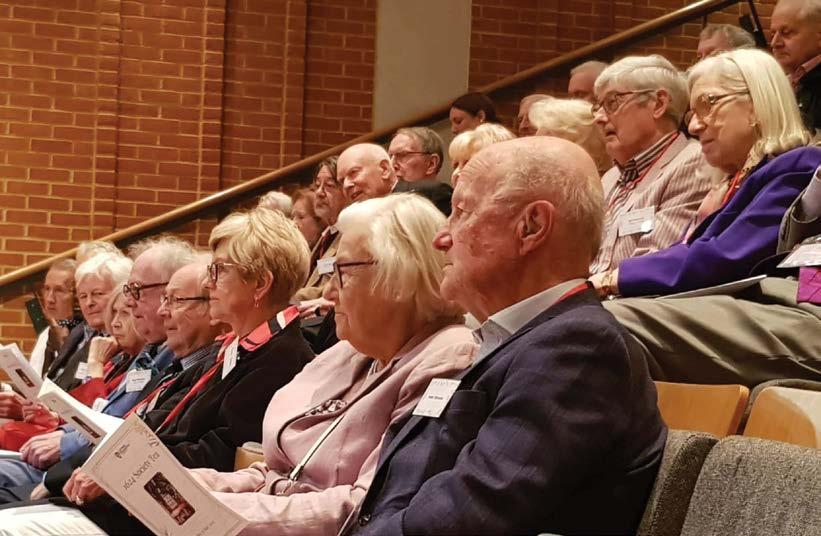
To learn more about the 1624 Society, please contact Verity Mynorsvem@latymerfoundation.org
Thank You and Farewell



Celebrating the careers of our
long-
standing teachers on their retirement
Barry Bladon
Barry joined Latymer in 1992, fresh from his History degree at King’s College London, and plunged straight into the famous Grosmont Year 7 trip—a fitting initiation for someone who would become a fixture in both the History department and wider school life.
A historian of extraordinary breadth, Barry taught everything from the Tudors to post-1850 Russia and the British Empire, edited the Sixth Form History magazine, and delivered unforgettable assemblies, often steeped in the school’s own past. His commitment to his students was deep and personal.
But Barry’s brilliance extended far beyond the classroom. As Head of Drama, he directed 16 wildly varied productions, each marked by boldness and emotional truth— most memorably a moving staging of Dennis Potter’s final interview. Musically, his passion for salsa led to the founding of the “L@tymer Pupi Tribute Band,” with Barry arranging pieces and playing keyboard at Friday rehearsals that pulsed with joy and discipline.
His dedication to the Uganda partnership saw him skydive 11 times to raise funds, and he was a tireless force behind nearly three decades of Grosmont trips—organising, driving, guiding, cooking and laughing his way through what amounted to a full extra year of service.
As a colleague, Barry was loyal, modest, and dryly hilarious. Always serene on the surface, he worked with tireless commitment and never sought recognition. Swans may be common—but Barry is a rare bird indeed.
Justin
Joseph
Justin joined Latymer in 2005 and for 20 years has brought a unique blend of mischief, passion and theatrical brilliance to the school. A joker at heart, he frequently reminds students and colleagues not to take things too seriously.
With a background in acting and opera, Justin’s style was less about the glitz and glamour of theatre and more interested in the craft of acting and the use of the stage to tell great stories. During his time at Latymer, Justin directed large-scale school productions that included Shakespeare, modern classics, and obscure modern and period plays. These productions were exciting, often risk-taking, always bold and original. Notably in 2024, as part of the 400th anniversary of the Latymer Foundation, Justin commissioned a play by Latymerian Ruby Thomas (2009), which told the story of the Hamburg exchange, created after World War II. The play, performed at Richmond Theatre, was a moving story of forgiveness and reconciliation across three generations.
Students loved working with him— braving freezing rehearsal spaces and spending weekends bringing plays to life under his watchful (and playful) eye. His motto: “Surprise each other. And yourselves.” And they did.
Alongside the big shows were GCSE and A level performances, touring pantos, whirlwind Edinburgh productions and even the staff panto—somehow always stage-ready in time. He led a high-achieving department with energy, imagination and an enviable ability to connect with students—many of whom went on to careers in theatre, as actors, designer and technicians, with Justin continuing to support them long after they left.
Justin’s talent, humour and warmth will be deeply missed—but his legacy lives on in the countless students he inspired.
David Mumby
David retired in December 2023 after running the Art Department for 32 years.
Nobody who saw David would doubt that he was an art teacher. With his distinctive red chinos and stylish selection of thin ties, he stood out for his remarkable aesthetic sense. More significantly, he was passionate about his subject. A talented artist - he trained in ceramics but didn’t confine himself to this- David not only continued to put on his own shows throughout his time at Latymer, but seemingly attended every exhibition that was on in London. Whether one met him in the atrium cafe or attended one of his classes, David was always happy to chat about other artists, readily producing images to enlighten those of us who were less artistically literate. He always had great art recommendations and he lives and breathes his advice to students to ‘make the most of London’.
Art at Latymer was truly outstanding during David’s time here. A cornerstone of the week was his running of his life drawing programme - three classes a week. The Year 9 Creative day was another representation of the way he cared about his students and maintained connections - all the speakers were former students plus one Latymer parent. The students’ results were superb, and the end of year exhibitions were a highlight, as were all the other opportunities afforded them: the annual foreign trips, to America, Italy etc.
For many, the art studios provided a kind of sanctuary from the demands of school life, a place where music was always playing, dress rules were relaxed and time seemed to stop for a while. The studios attracted parents too and David’s weekend drawing events (‘The Big Draw’) were legendary.
Fondly Remembered
■ Richard (Dick) Brown (1962)
■ Graham Harrison (1967)
■ Graham Hill (1954)
■ John Lyon Leonard (1957)
■ Charles Newman (1954)
■ James ‘Jim’ Power, staff member 2020-2025
■ Derek Sinstead (1947)
■ Paul Slater (1972)
■ Rev Peter Stubbs, former staff
Professor Frederick Vine (Class of 1957)
Fred was a marine geologist and geophysicist whose work was pivotal in the development of plate tectonics.
Born in Chiswick, Fred studied at Latymer, where he subsequently taught for a short while, and St John’s College, Cambridge. As a research student at Cambridge in 1962, Fred synthesised emerging ideas on sea-floor spreading, geomagnetic reversals, and continental drift into a model that revolutionised our understanding of Earth’s geology. His 1963 paper with Drummond Matthews provided the first clear evidence for sea-floor spreading, laying the
foundation for plate tectonics. Though initially overlooked, his work gained widespread recognition by 1966 and became central to modern geology.
After earning his PhD, he worked at Princeton before joining the University of East Anglia in 1970, where he advanced research on oceanic crust and the Earth’s magnetic history. Elected a Fellow of the Royal Society in 1974, he also contributed to environmental science and climate research.
A modest man who credited others for his success, Fred retired as emeritus professor in 2008. He is survived by his wife, Sue, their children, Rachel and Stephen, and six grandchildren.

Martin Wade (Class of 1962)
Martin died peacefully at home in Kent on 15 September 2024 with his family at his side. Loving and dearly loved husband of Vicky, adored father of Nicholas, Georgina, and Charles, and grandfather of Finnian, Samuel, and Oscar.
Martin was such an influential figure whilst at Latymer, and an involved alumnus thereafter; he was School Captain in 1962, as well as serving two terms as Captain of Boats -1960-61 and 1961-2. Excelling both academically and in sporting pursuits, Martin’s presence was also felt on the stage, where he held the post of Forwardmannus of the Gild. In later years, Martin had been hugely supportive of Latymer’s Boat Club as well as our bursary programme, serving on Latymer’s Development Committee and latterly on our Inspiring Minds Campaign Board.

Edward ‘Ted’ Stead, former teacher
Ted Stead, a charismatic and inspiring English teacher at Latymer from 1962 to 1968, passed away on 15 May 2025 at the age of 86. His infectious enthusiasm for English and Drama left a lasting impression on a generation of students.
After completing his National Service—including an MI6 stint in West Berlin—Ted threw himself into Latymer life, directing plays, performing in the Gild, and even staging Britten’s Noye’s Fludde with over 100 participants. He was a standout presence at the Jantaculum, often stealing the show with his comedic performances and flamboyant costumes.
A brilliant communicator, he was especially passionate about Shakespeare and Chaucer. In 1968, he left to become Head of English at Gravesend Grammar but remained close to his Latymer friends, organising annual outings to The Mousetrap in the West End.
Ted’s legacy is best captured by a quote from Stephen Leacock: “He flung himself madly from the room, flung himself upon his horse, and rode madly off in all directions.”
Martin Wade (1962)
Professor Frederick Vine (1957)
Captain John Neumark MBE (Class of 1945)
We are grateful to John’s wife, Pat, for the following tribute.
Upon leaving school, John briefly worked for Gaumont British Studios as a Clapper Boy before becoming an Assistant Cameraman.
In 1944, he was called up into the Army and served in Egypt, Kenya, Aden, and Cyprus. He obtained a commission in the regular Army and, after 20 years of service, retired with the rank of Captain.
John joined the NHS in 1963, taking on various roles in the Finance and Supplies Departments. He later became a Divisional Supplies Manager, overseeing the procurement of goods and services and managing store departments for hospitals and health establishments across Central and East Kent. He retired from the NHS in 1987.
Following his retirement, John became deeply involved in village life in Elham, where we lived at the time. In recognition of his contributions to the community, he was awarded an MBE. In 2001, we moved to Whitstable to be closer to our youngest daughter, her husband, and their young family—a decision that has served us well in our later years.
In 2024, we celebrated our 70th wedding anniversary. John was devoted to his family—our son and two daughters—and took great pride in his four grandsons and greatgranddaughter.
He often reminisced about his school years at Latymer, though he admitted he was not the most diligent student!
John was not unwell for long, for which we are very grateful. He will be deeply missed by all our family— a long life, well lived.

Douglas Gurney (Class of 1953)
We are grateful to the Roehampton Croquet Club for the following tribute.
Douglas was born and brought up in Chiswick. After Latymer, he took up his National Service with the RAF, before going on to study dentistry at Guy’s Hospital, University of London. He practised as a dentist in East Sheen until he retired in 2000. He was an accomplished oarsman and a keen swimmer in the outdoor pool, and had a passion for opera.
Since joining in 1970, Douglas served as both Captain (2003) and Chairman (2004 and 2005) at the Roehampton Croquet Club. In 2018 he was awarded the Croquet Association Diploma for services to the sport.
He will be greatly missed by his many friends.

Dr Christopher George Haupt (Class of 1952)
We are grateful to Chris’s daughter, Sarah, for the following tribute.
Christopher passed away peacefully at his family home in Frome, Somerset on 15 September 2024, age 91.
Christopher grew up in North Harrow and attended Latymer in the 1940s. He always spoke very fondly of his time at Latymer and was a long-time supporter of the Foundation.
Christopher studied Chemical Engineering at Birmingham University, where he gained a PhD, specialising in combustion science. He spent his career working for Shell Oil and was fortunate to travel the world and have a fulfilling career in his chosen field.
He married Marilyn Haupt (nee Andrew) in August 1958 and they had three children, Richard, Jessica and Sarah. They remained married for 62 years until Marilyn’s death in June 2021. He spent their last years together as her sole carer as she lived with Alzheimers.
A man of hobbies and interests, he was an avid model engineer, fly fisherman and camera collector. He loved to read and retained his zeal for knowledge throughout his life.
A larger than life presence, never short of an interesting fact or entertaining anecdote, he will be very much missed by his family and friends.
Dr Alan K Huggins MBE (Class of 1954)
We are grateful to Alan’s son, Christopher, for the following tribute.
Born on 23 May 1936, Alan trained as a biochemist at University College London. His PhD thesis was Uncoupling Reagents and Intermediary Metabolism in Isolated Tissues (1962; King’s College School of Medicine and Dentistry), and he pursued an academic career before moving into university administration. He was Deputy Secretary at University College London from 1986-1990 and a Pro-Provost from 19972002, being elected a Fellow of the College in 2001.
Outside his working life my Father had a life long interest in philately and was a distinguished philatelist in his own right. An appreciation of this aspect of his life can be found on the website of The Royal Philatelic Society.
Douglas Harry Pull (Class of 1947)
We are grateful to Douglas’s daughter, Liz, for the following tribute.
Douglas was born in Brentford and attended Latymer during the 1940s. This followed his time as an evacuee in Chesham, Buckinghamshire. Douglas worked for Lloyds Bank up until his retirement and was a lifelong fan / season ticket holder of Brentford Football Club. Forever in our hearts, 01/08/1930 - 02/11/2024.
Douglas Gurney (1953)
Dr Christopher George Haupt (1952)
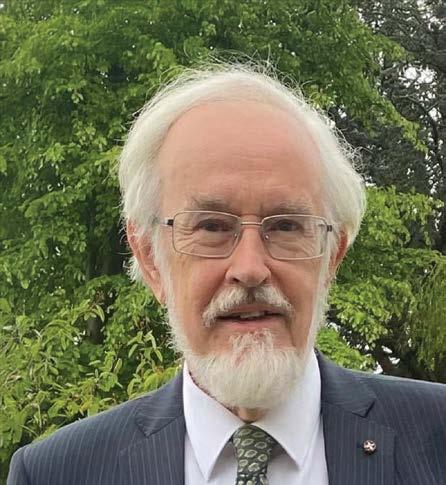
Paul Ellis White (Class of 1968) We are grateful to Paul’s daughter, Helen, for the following tribute.
Paul White, who attended Latymer Upper School from 1961 to 1968, died in February 2025. Born in Luton in 1950, Paul moved to Twickenham aged five and success in the 11 Plus gained him a direct grant place at Latymer. At school he formed friendships that would last throughout his life. Known as ‘Chalky’, his schoolfriends remember him as someone who, despite his eminent achievements, offered humour, humility and fun.
Inspired by his teacher Graham Bearman, Paul went on to study Geography at Hertford College, Oxford, graduating with a First, following which he obtained a PhD. During his time at Oxford he met Liz, whom he married in 1973. He spent his career based at the University of Sheffield, starting as a lecturer in Human Geography in 1974, rising to become a Professor of European Urban Geography in 1997. His interests included migration, demographic change and social exclusion. He supervised 36 PhD students and led 29 foreign field classes, in Normandy, Paris and Berlin.
In 2004 Paul became Pro-Vice Chancellor for Teaching and Learning at the University of Sheffield, a post he held until 2014 when he became Deputy Vice Chancellor. He was a respected leader nationally and internationally, holding roles as visiting professor across Europe and roles leading the improvement

John James Beavis (Class of 1942) We are grateful to John’s daughter, Diane, for the following tribute.
of teaching across the UK and beyond. Paul’s contributions were recognised by an OBE for services to Higher Education in 2016 and an Honorary Degree from Sheffield University in 2022. He retired in 2016, although continued to act as public orator at graduation ceremonies, as a Trustee for the Students’ Union, and as a Deputy Lieutenant for South Yorkshire.
A school trip to Austria in 1963 inspired the love of travel which Paul maintained throughout his life, both for work and pleasure. Many of his family’s happiest memories are of exploring new cities, cultures and countries together. In retirement Paul combined his love of walking and writing, undertaking several long walks, including from Sheffield to London, recording his reflections along the way. Music played a pivotal role in his life, playing the piano to a high standard, and he remembered his time in the Latymer school choir fondly.
Paul was seen as compassionate, thoughtful and an expert in many different fields. He has inspired students, colleagues and friends across the world. He is survived by his wife Liz, his daughters Katherine and Helen, and two grandchildren, Toby and Alice.
John started out life in the Harrow area, the eldest son of six children. He was lucky enough to gain a scholarship to Latymer, which he took up in 1937. Although it was quite a commute from Harrow to Hammersmith, his time at Latymer was to have a significant and positive impact on John’s life in a number of ways.
In the first place, John made two lifelong friends who were fellow classmates: Dennis Bower, who was to introduce John to his future wife, Joan; and Philip Laundy who was responsible for encouraging John to attend a dinner at Latymer in 2009, the first time that John had returned to Latymer since leaving school. This led to a fruitful relationship with Latymer for many years during which John was keen to support their bursary programme to ensure that others benefitted from a Latymer education just as he had all those years ago.
The outbreak of WW2 clearly impacted his studies as Latymer was evacuated to Slough. Although an even longer commute from Harrow, one of the perks was access to the sporting facilities of Eton College, including their rowing boats!
In 1940, John was required to sit his Matriculation exams. At the time, the outlook looked bleak as there was the very real threat of invasion appearing imminent. John admitted that he found it hard to stay motivated as there didn’t seem much of a future for him. It was therefore as much a testament to Latymer’s teaching as it was to efforts on John’s part that he passed all of his exams.
In terms of his career, on qualification as a Chartered Accountant, John joined John Laing as an accountant. In 1957, he was offered a position with the company in Rhodesia as Company Secretary and Financial Adviser, a position he held until John Laing closed down their Rhodesian operation in 1962. On returning to the UK, following several promotions, John was appointed as the Chief Executive of Laing Properties, eventually retiring in 1987.
Another milestone was reaching the age of 100 years! On his death, John was survived by his three daughters, six grandchildren and three great grandchildren.
John James Beavis (1942)
Paul Ellis White (1968)

The Foundation Office Team
Amanda Scott Executive Director, Latymer Foundation ams@latymerfoundation.org
Siân Davis Alumni Relations Manager sdd@latymerfoundation.org
Rhianna Williams Alumni and Communications Officer rpw@latymerfoundation.org
Sally Markowska Independent Consultant (Alumni Relations) sjm@latymer-upper.org
Johanna Ingram Events Manager jci@latymerfoundation.org
Verity Mynors Fundraising Officer vem@latymerfoundation.org
Leicha-May White Fundraising Assistant lkw@latymerfoundation.org
Michael Livingstone Database and Finance Manager mdl@latymerfoundation.org
Xiaochao (Sophia) Li Development Assistant sfl@latymerfoundation.org
Once a Latymerian, Always a Latymerian
From London to Sydney, Toronto to Hong Kong –our Latymerian Councils keep alumni connected to the school and to one another, no matter where life has taken you.
We currently have Councils in:
● The UK (The Latymerian Council)
● Asia (The Asian Latymerian Council)
● Australia (The Australian Latymer Council)
● Canada (The Canadian Friends of Latymer)
● The USA (The US Latymerian Council)
Want to learn more?
Please email: Latymerians@latymerfoundation.org
Latymer Foundation Office
Latymer Upper School 237 King Street, Hammersmith W6 9LR latymerians@latymerfoundation.org www.latymerfoundation.org 020 3004 0466
Disclaimer: All views, thoughts, and opinions expressed in our feature pages belong solely to the interviewee and/or author, and do not necessarily reflect that of Latymer.

